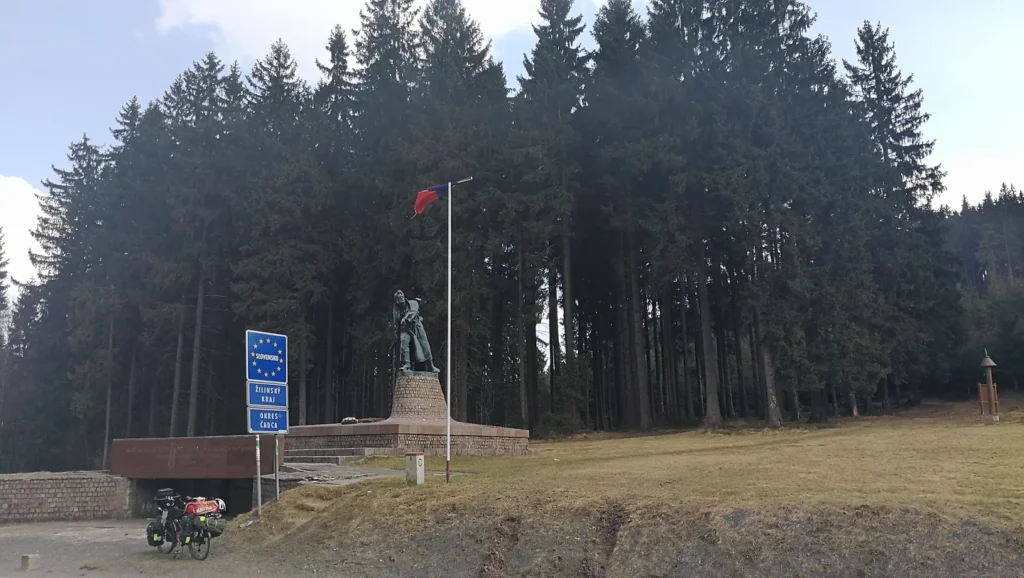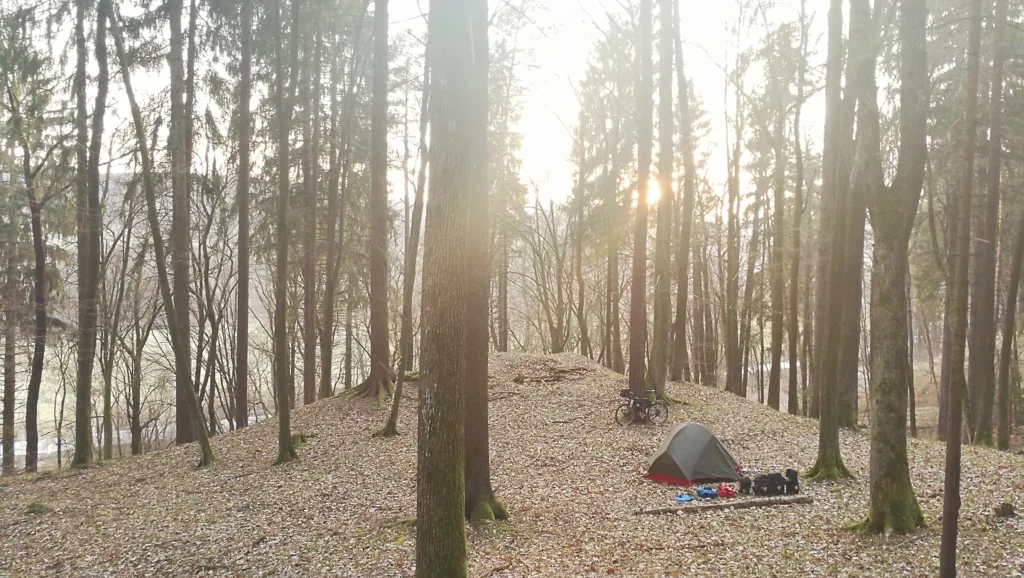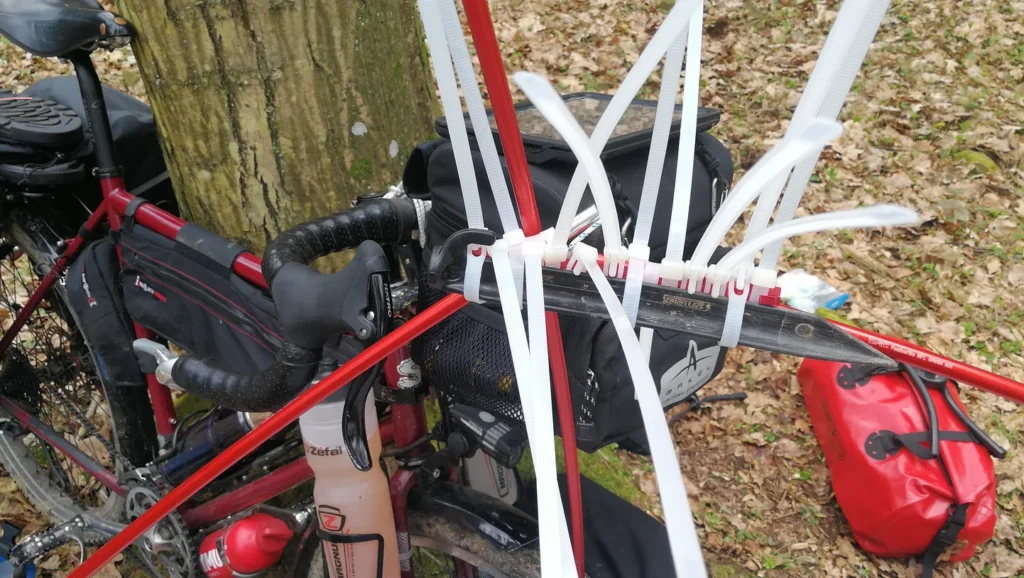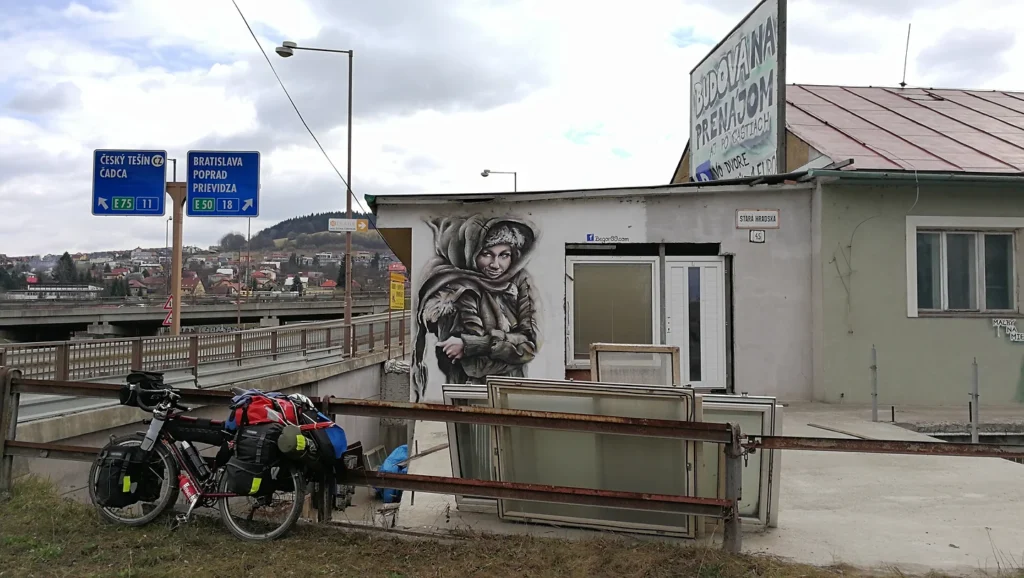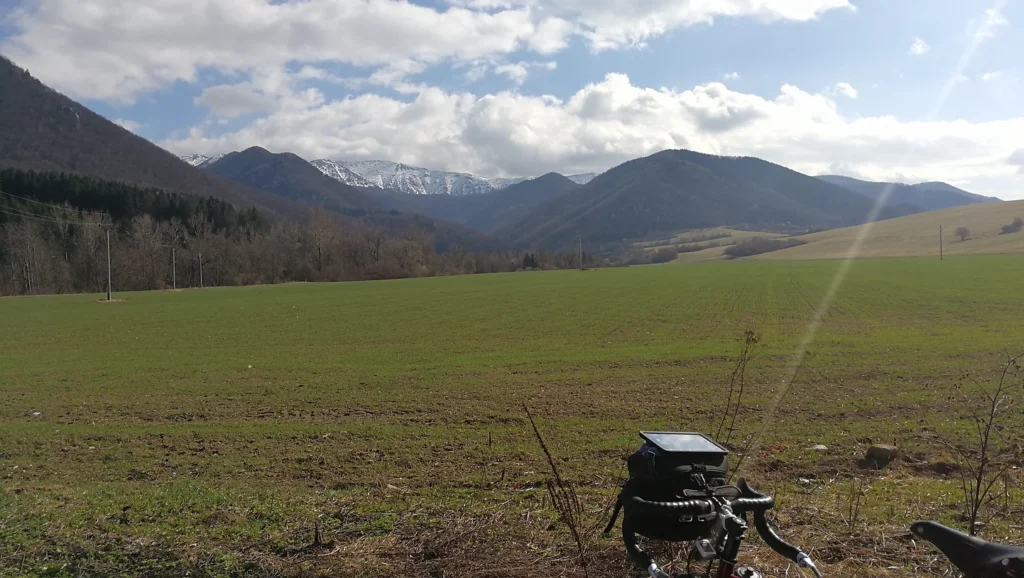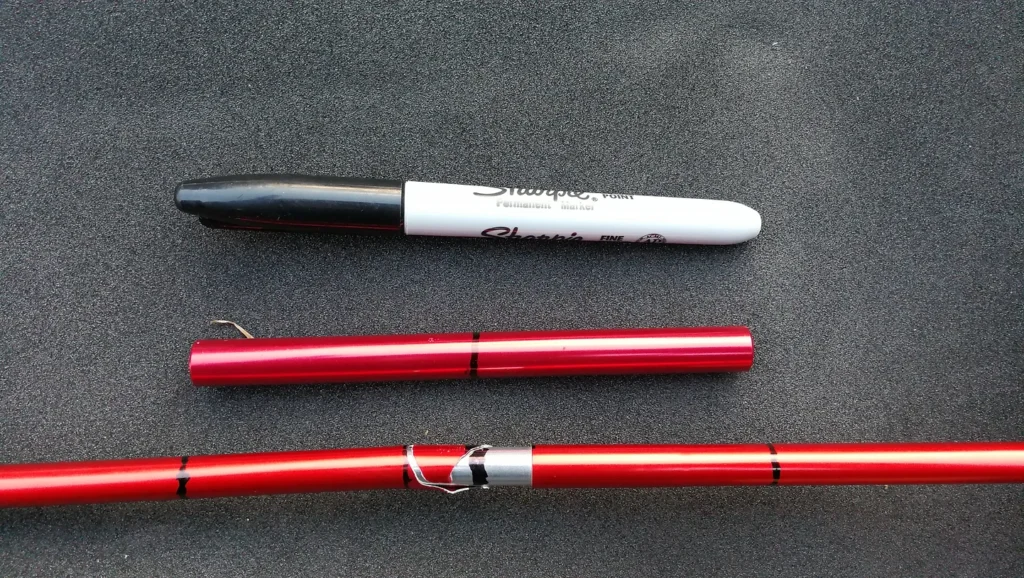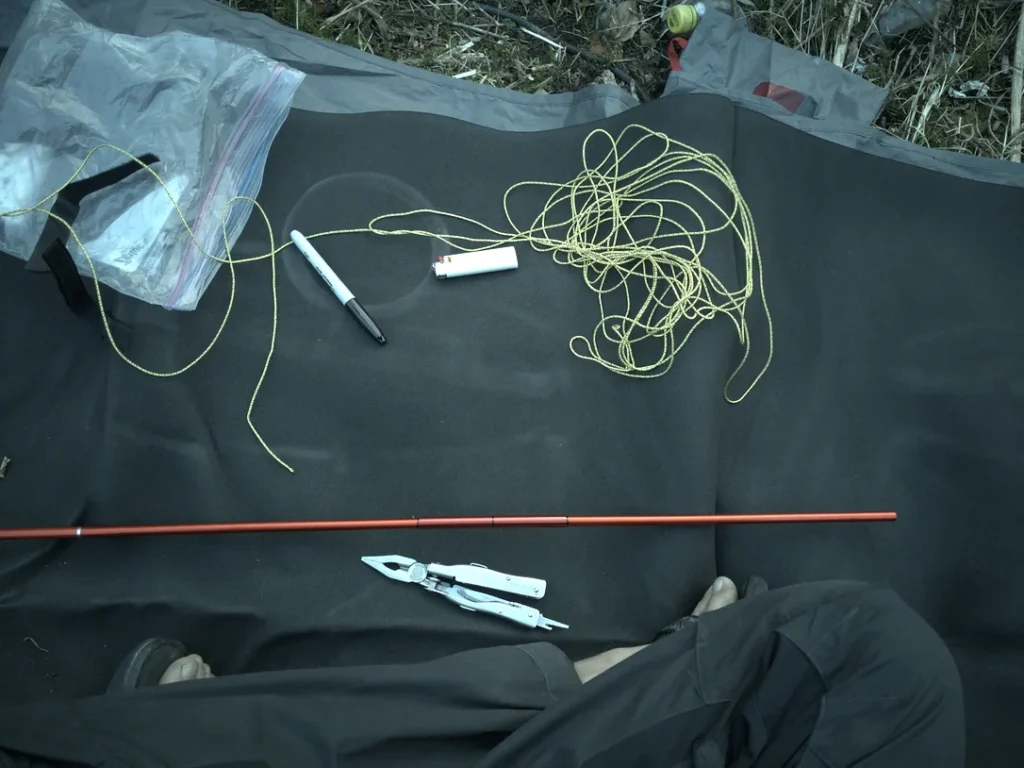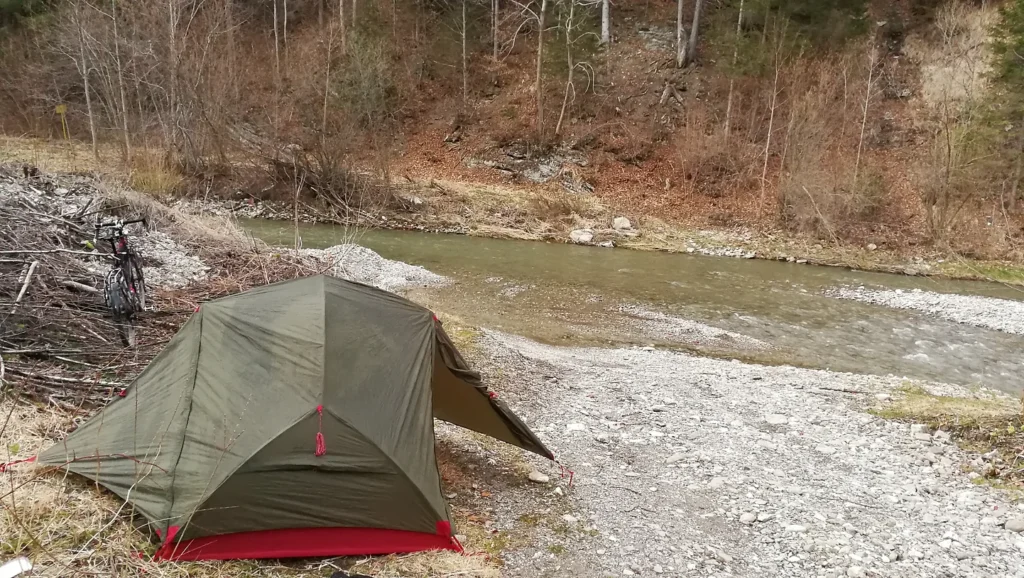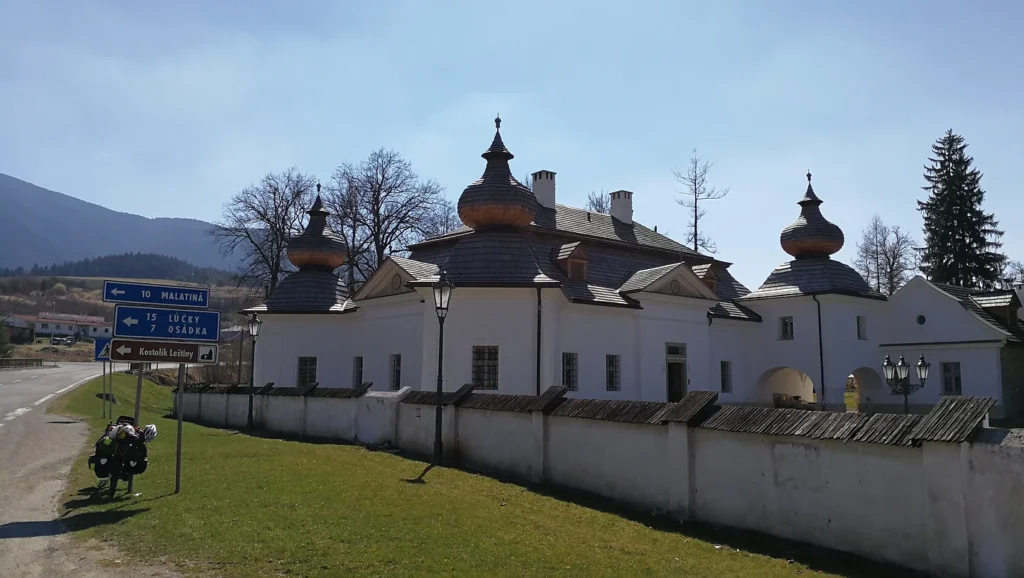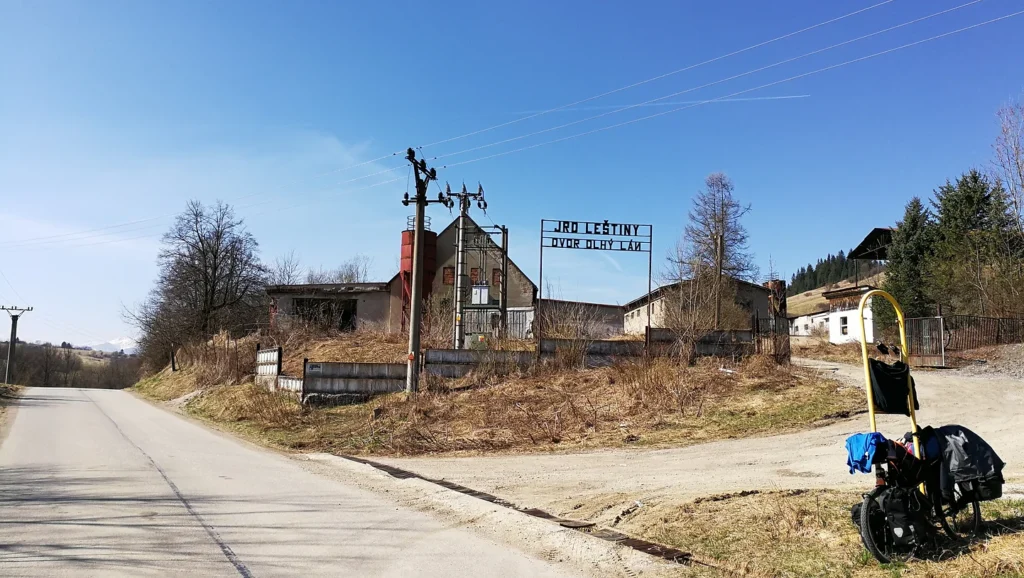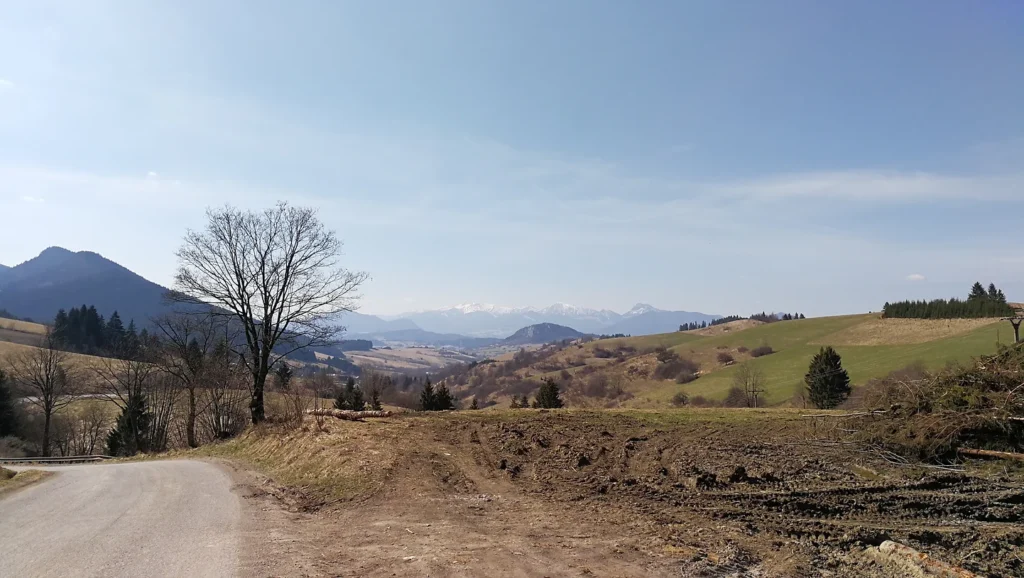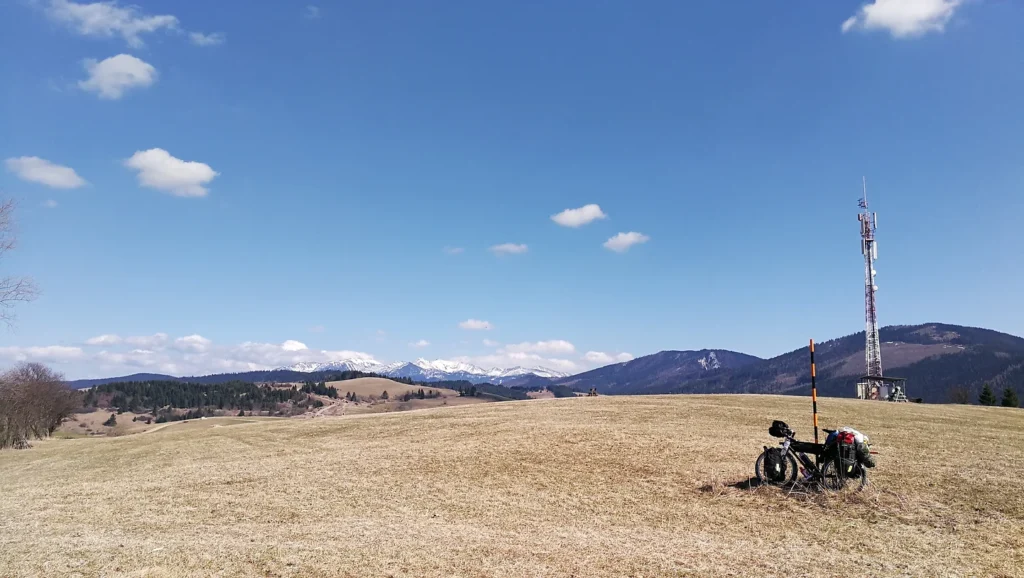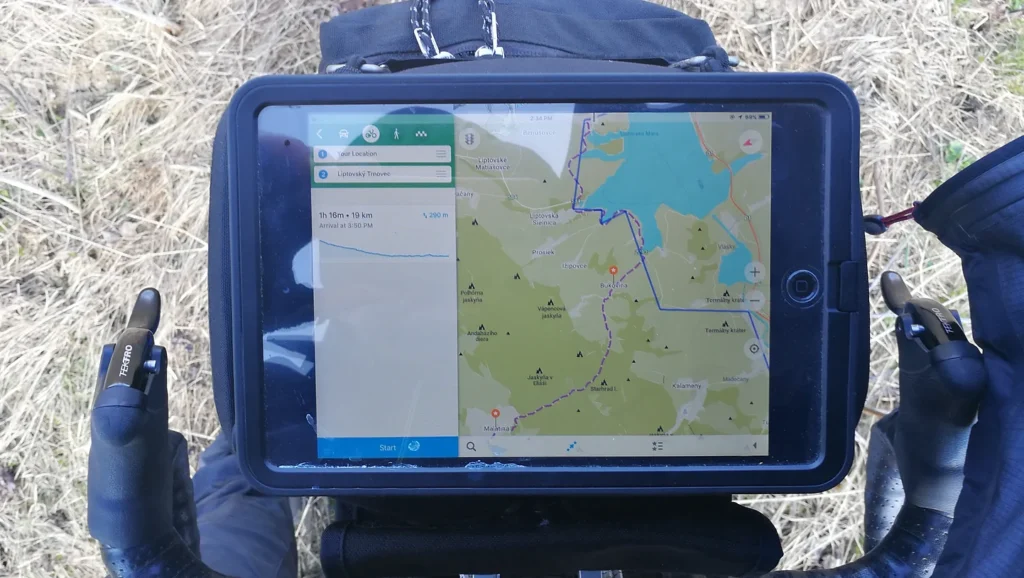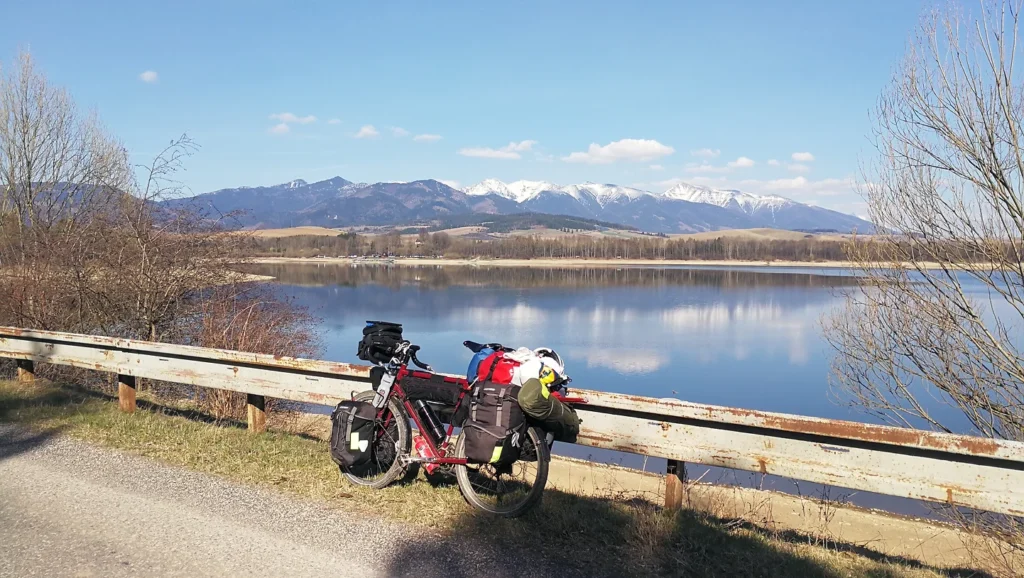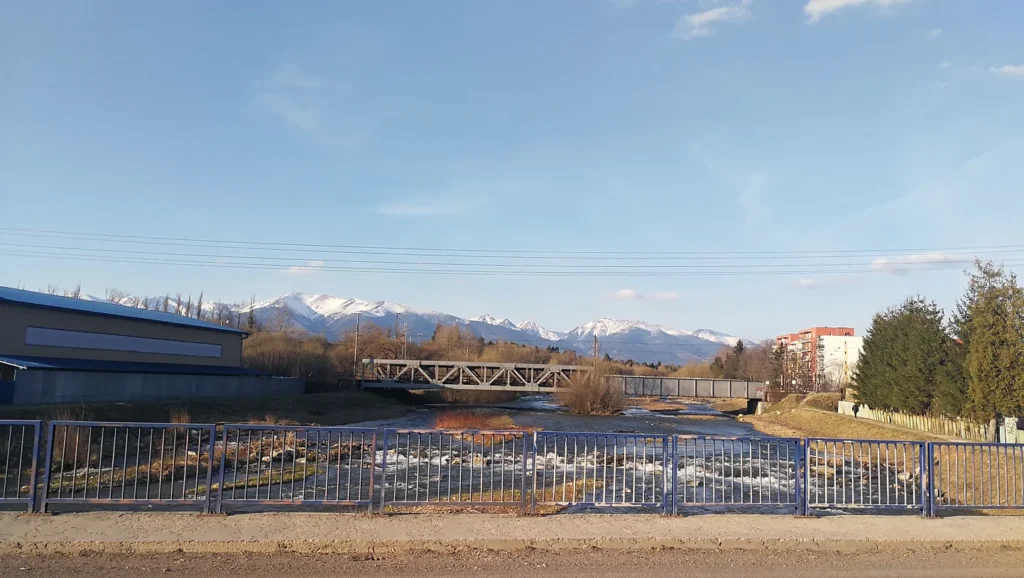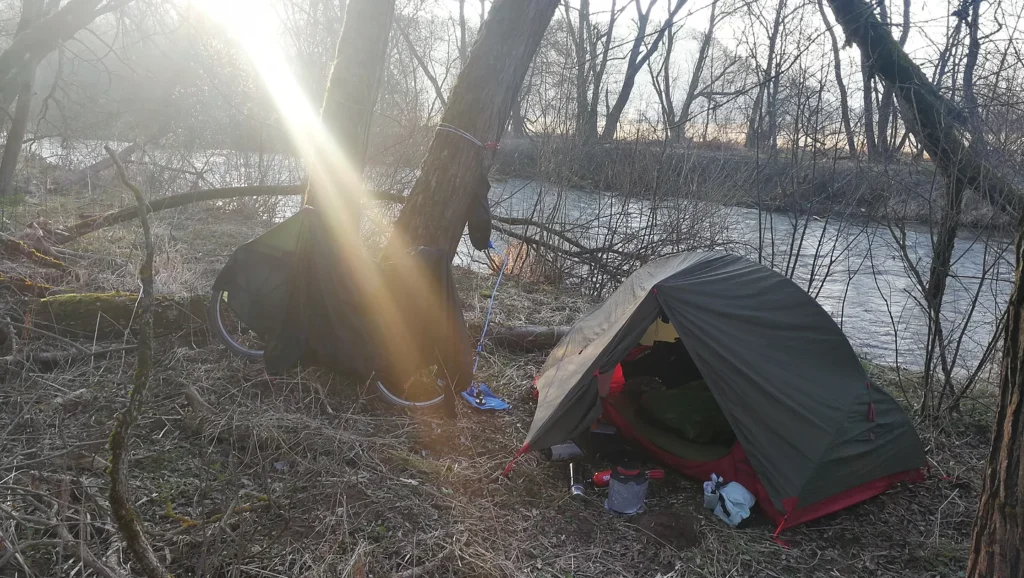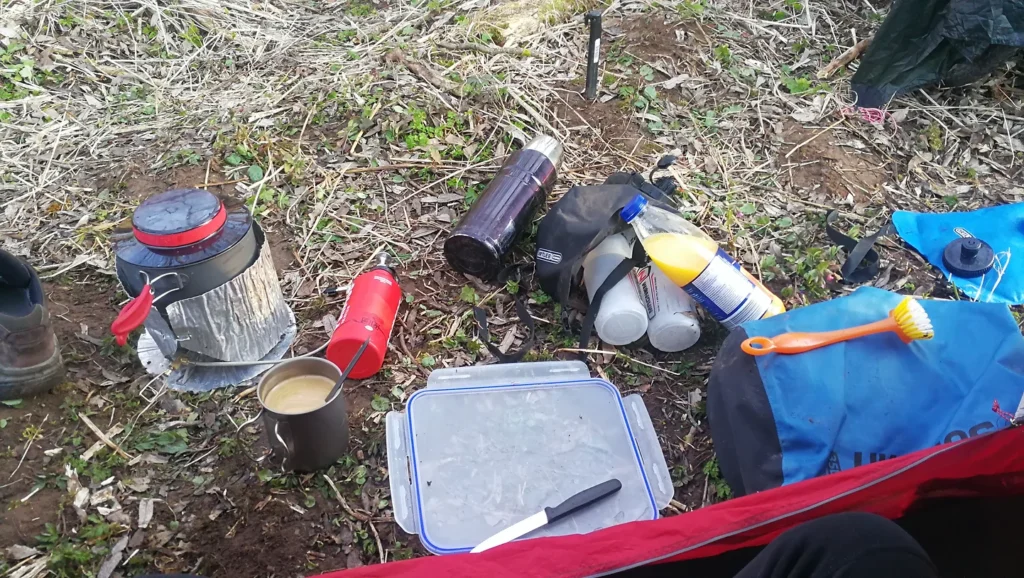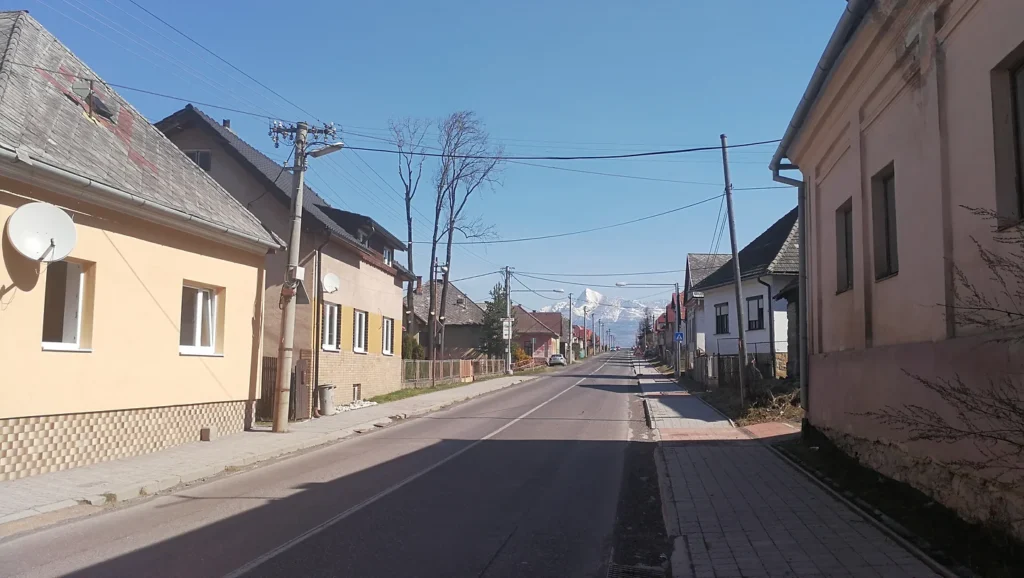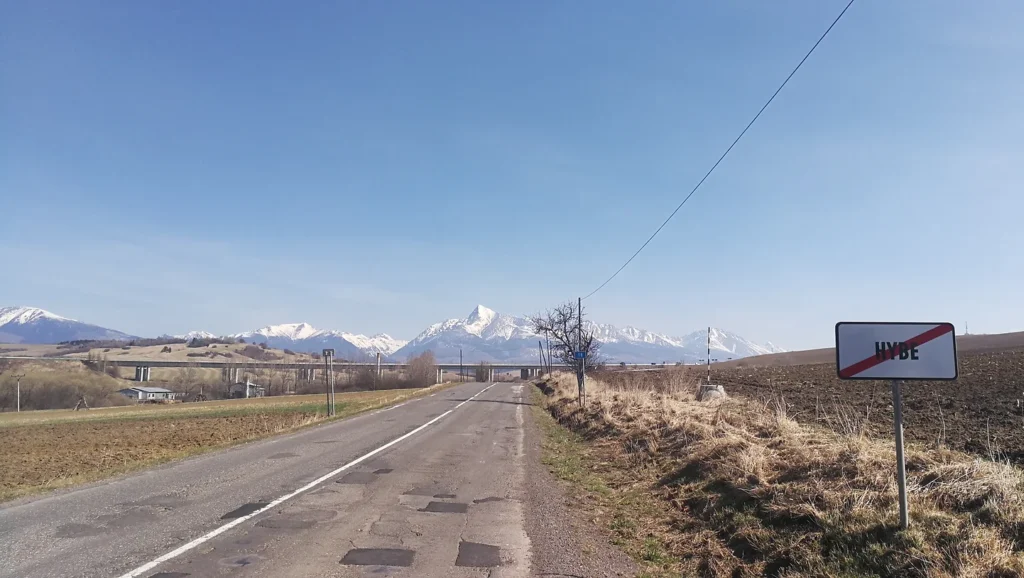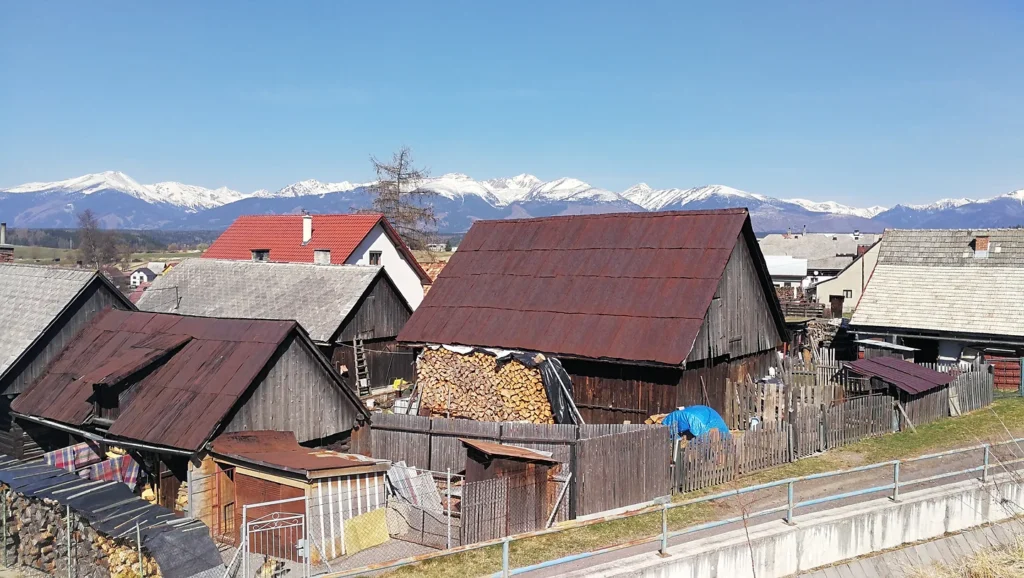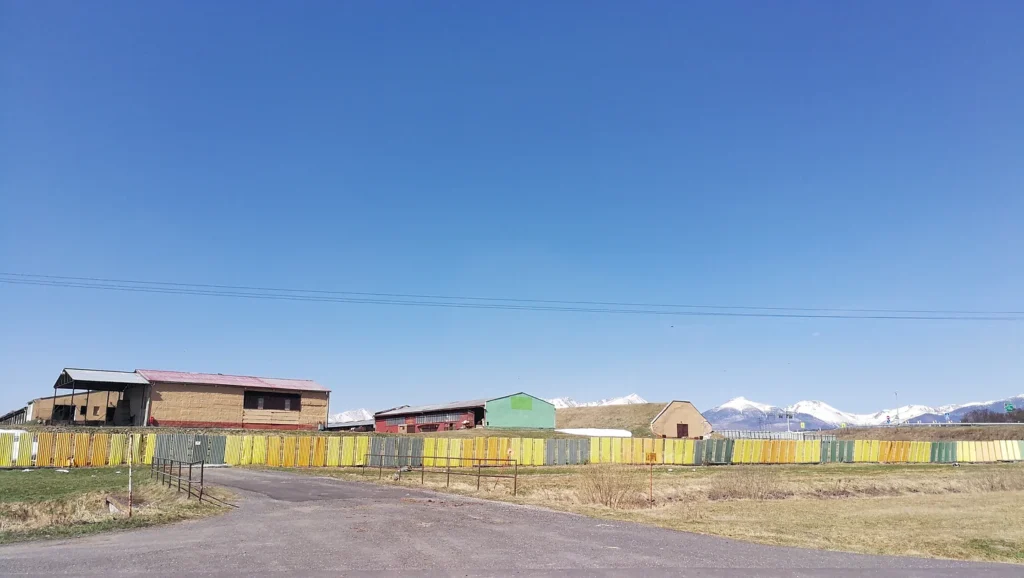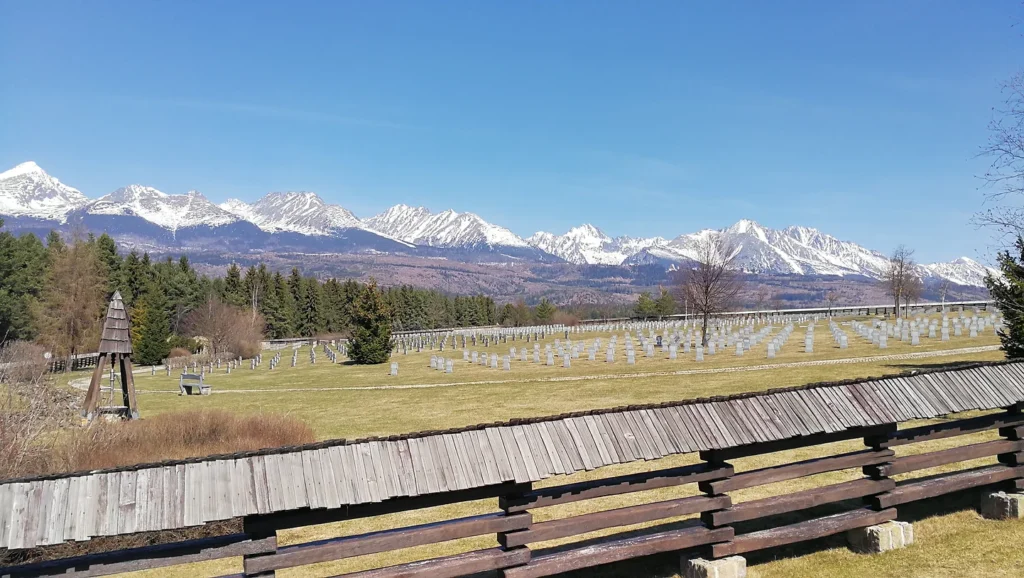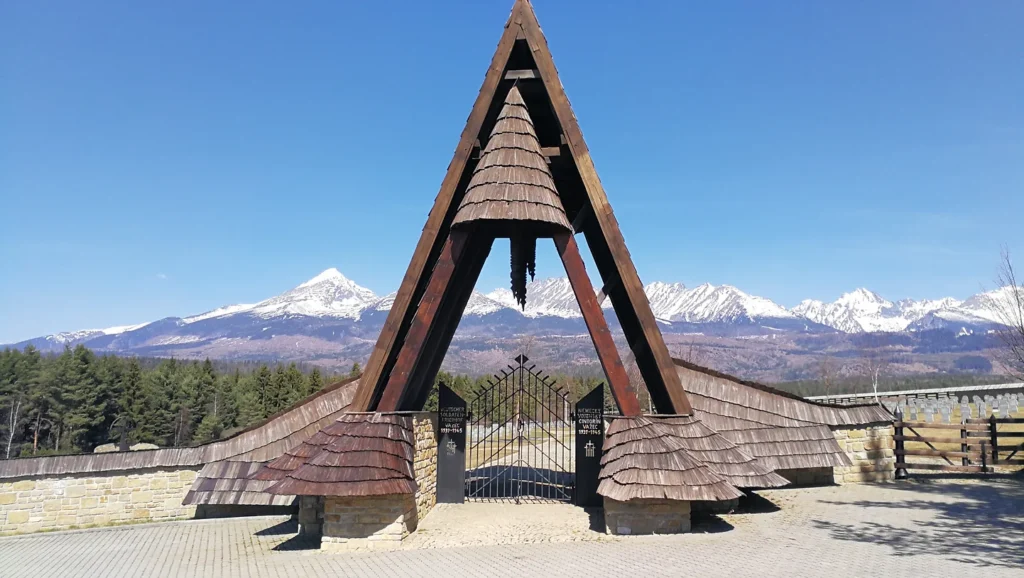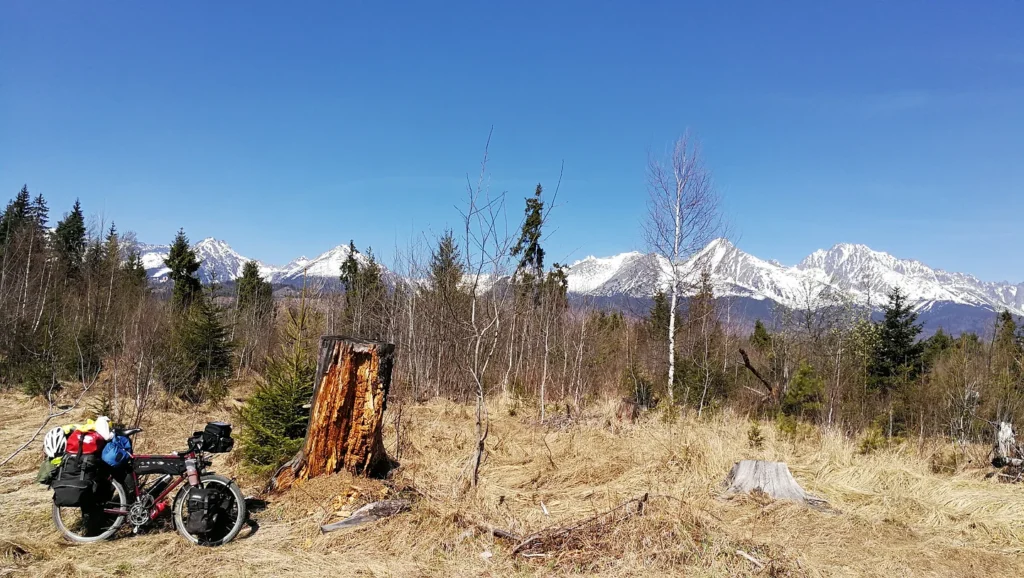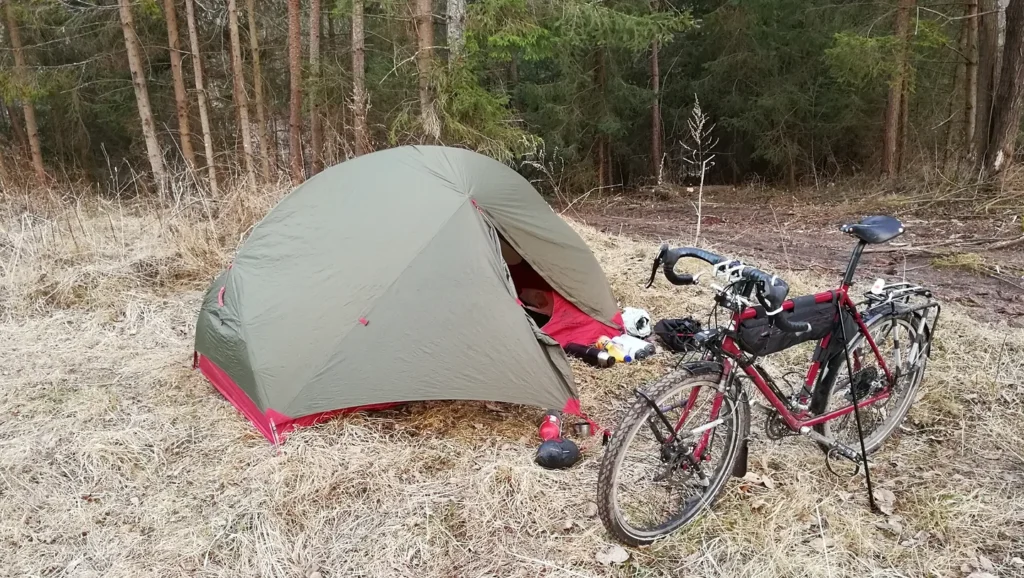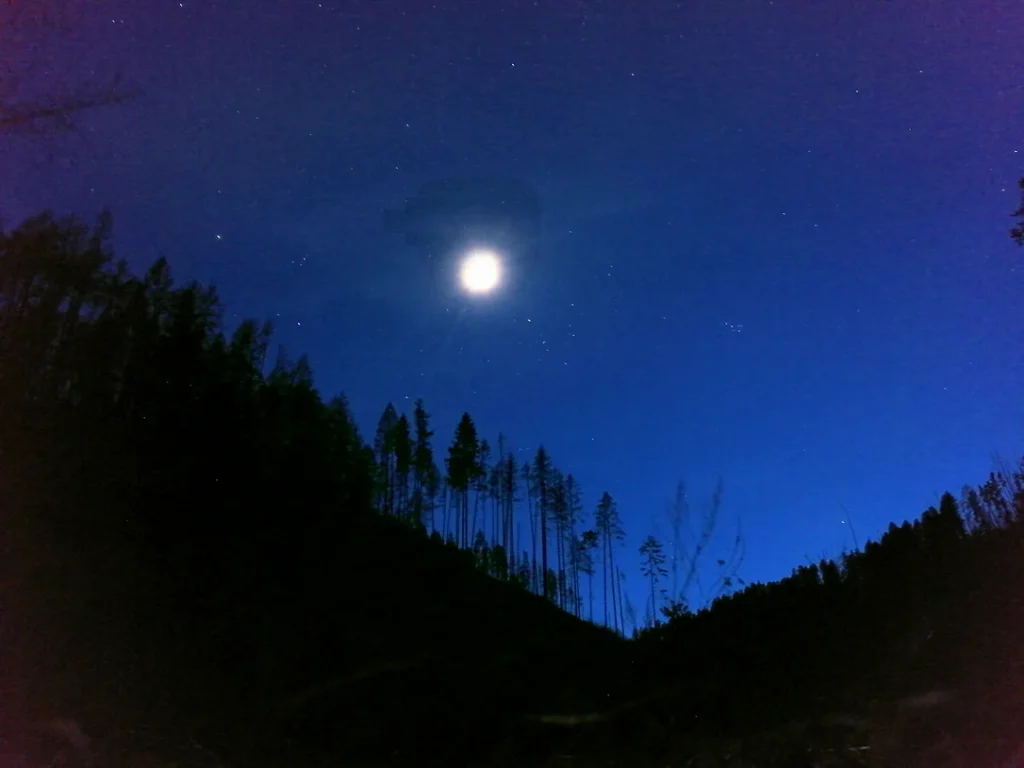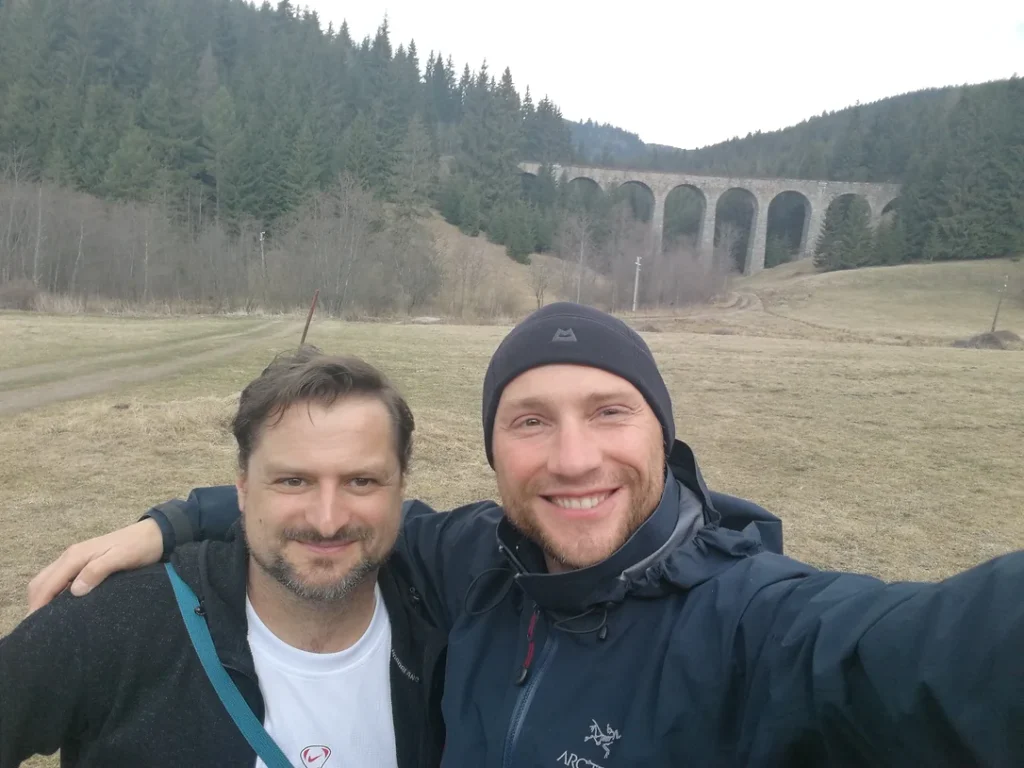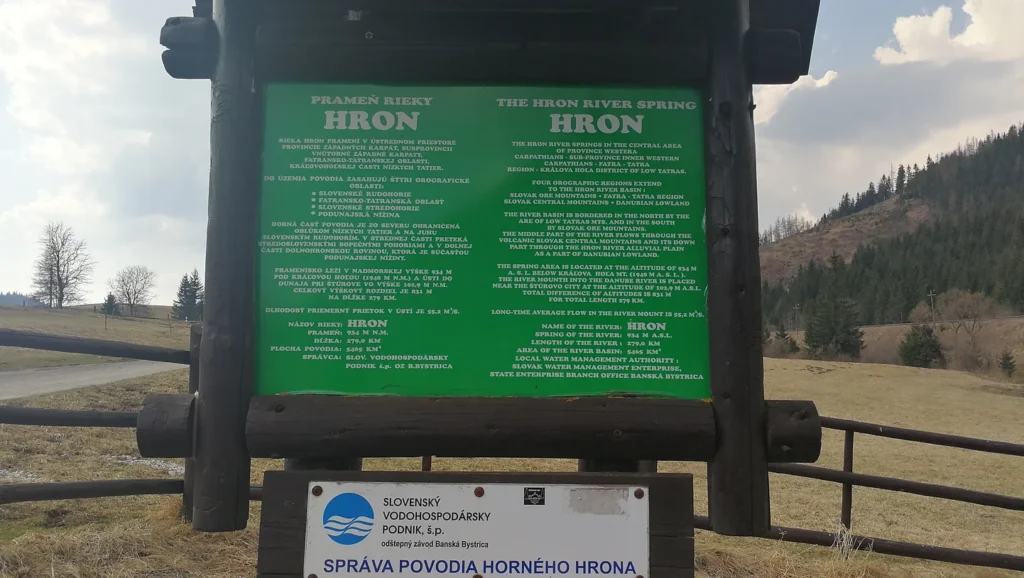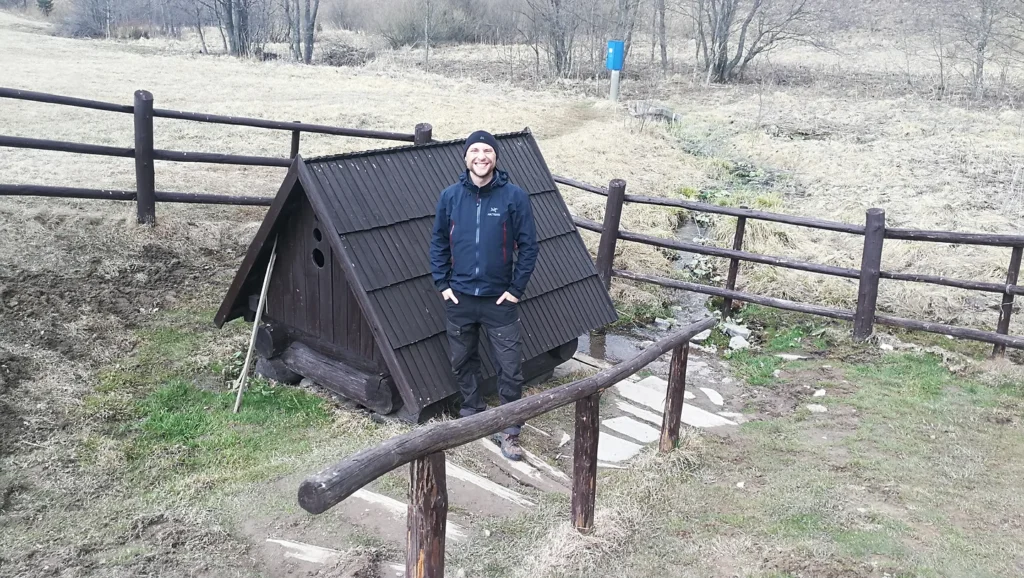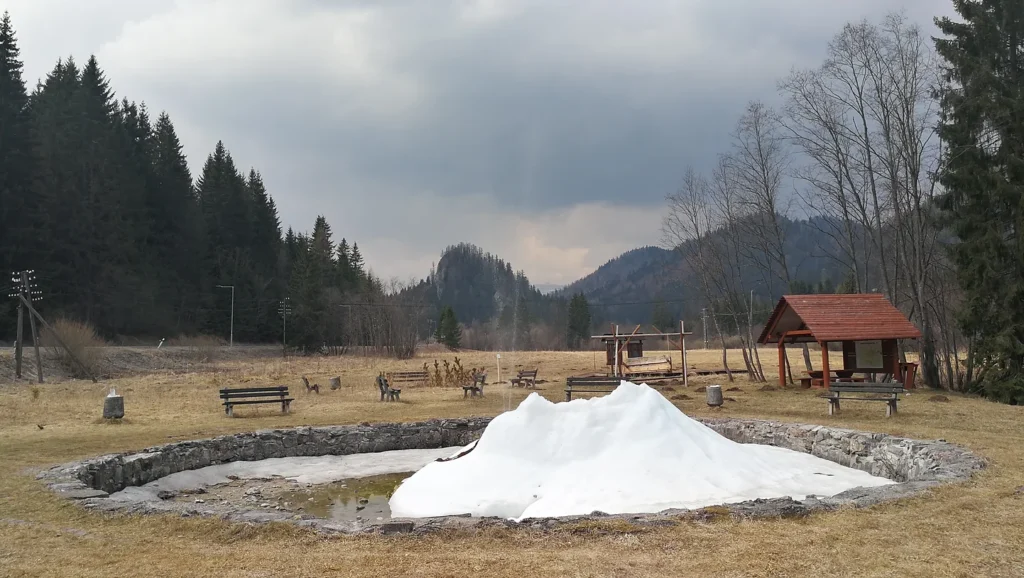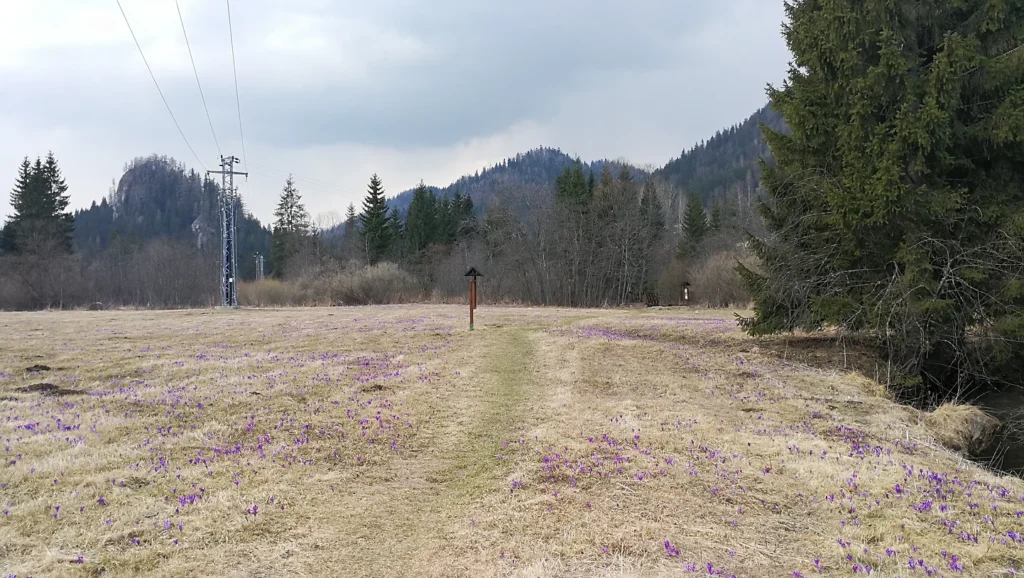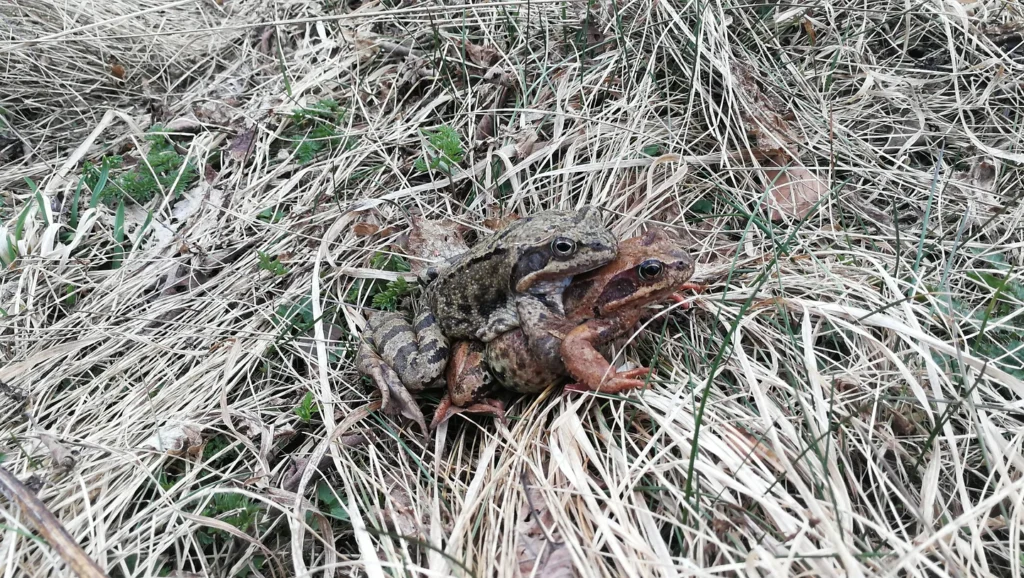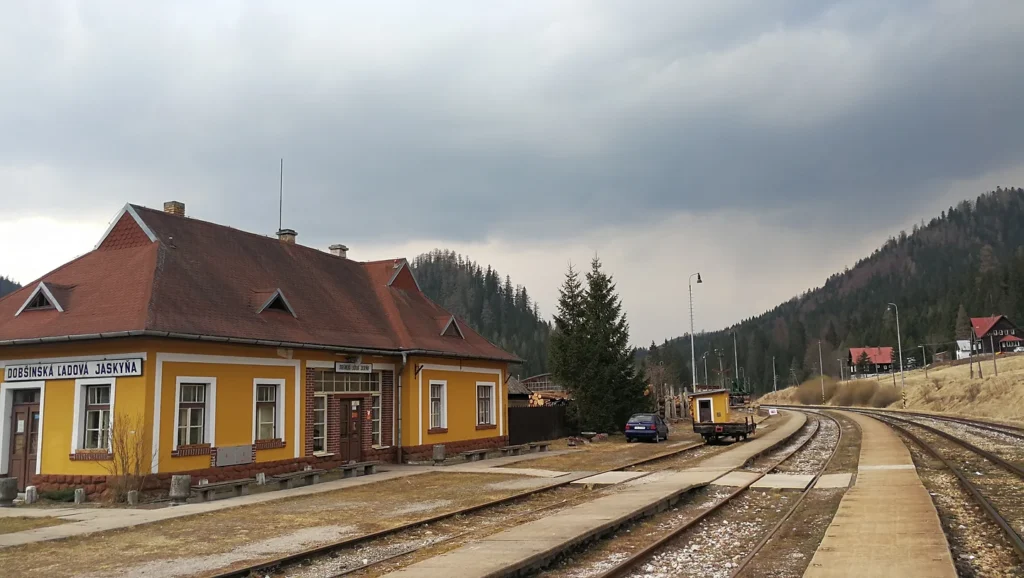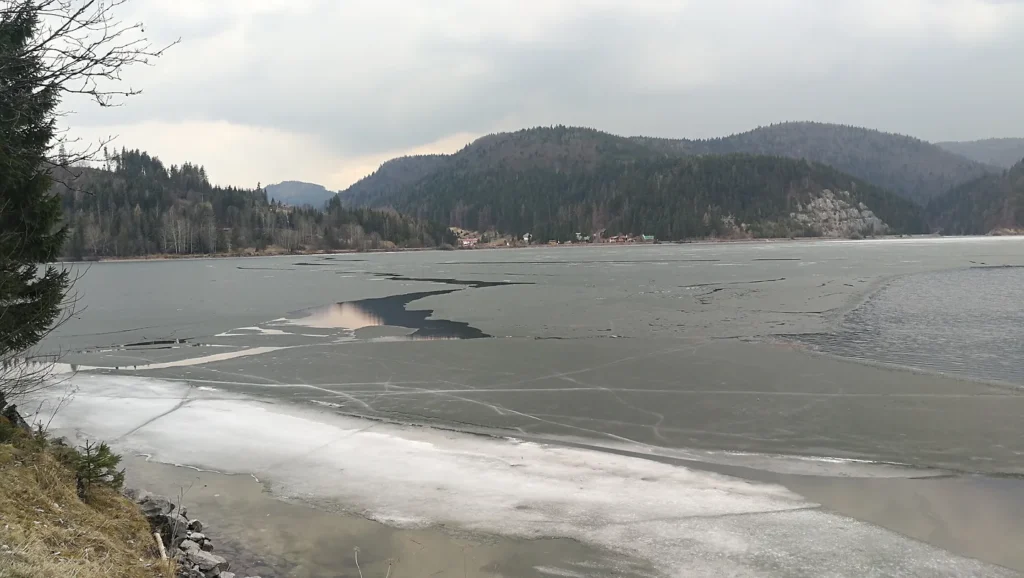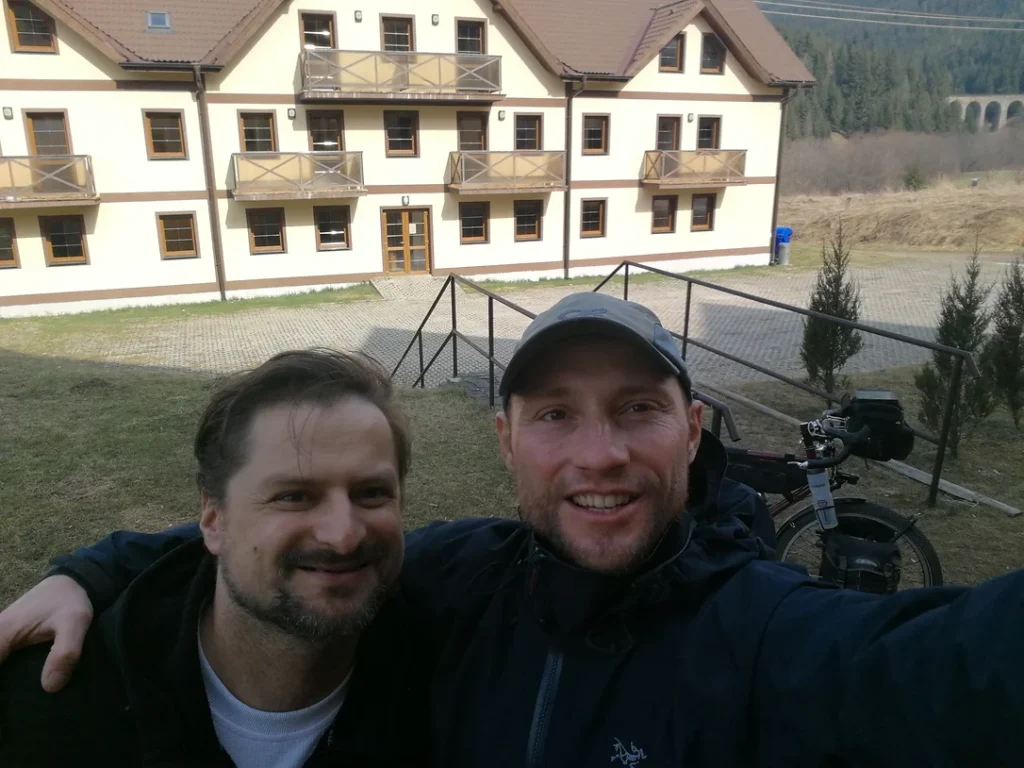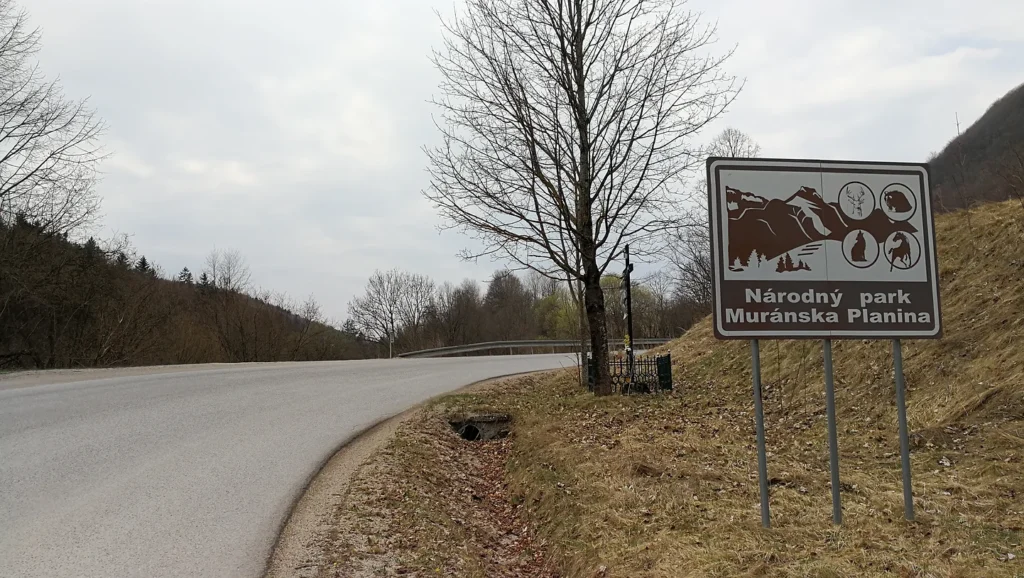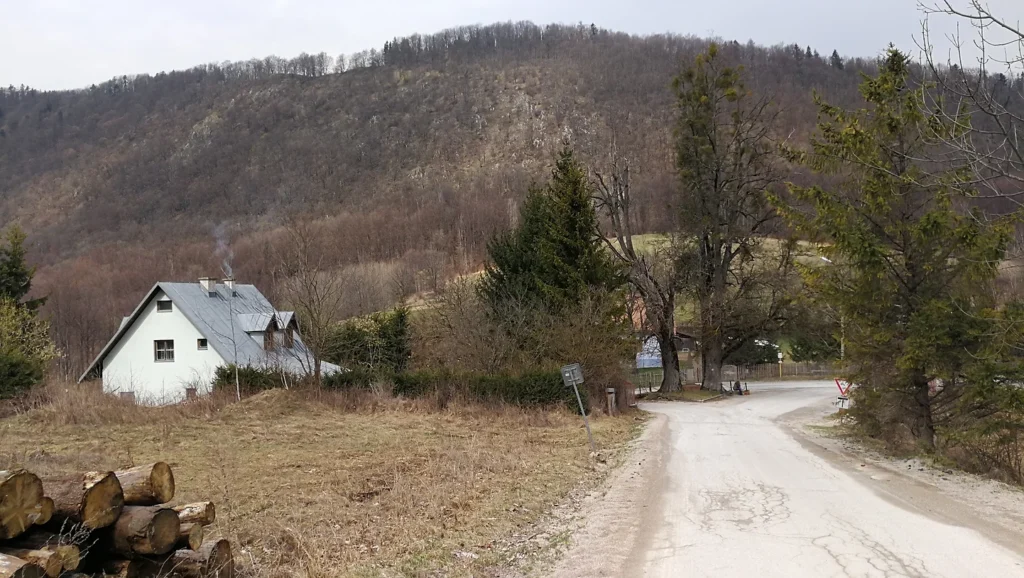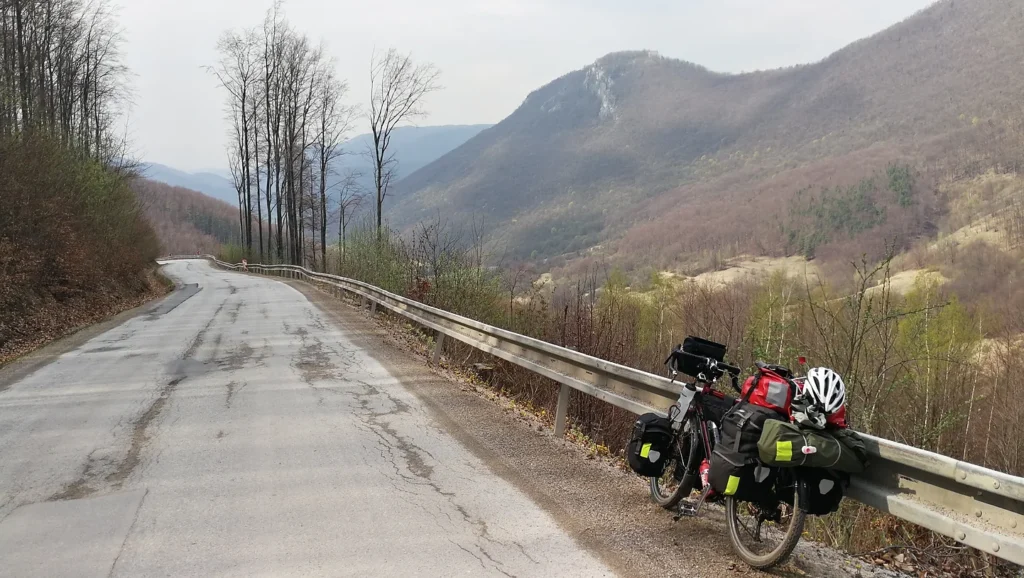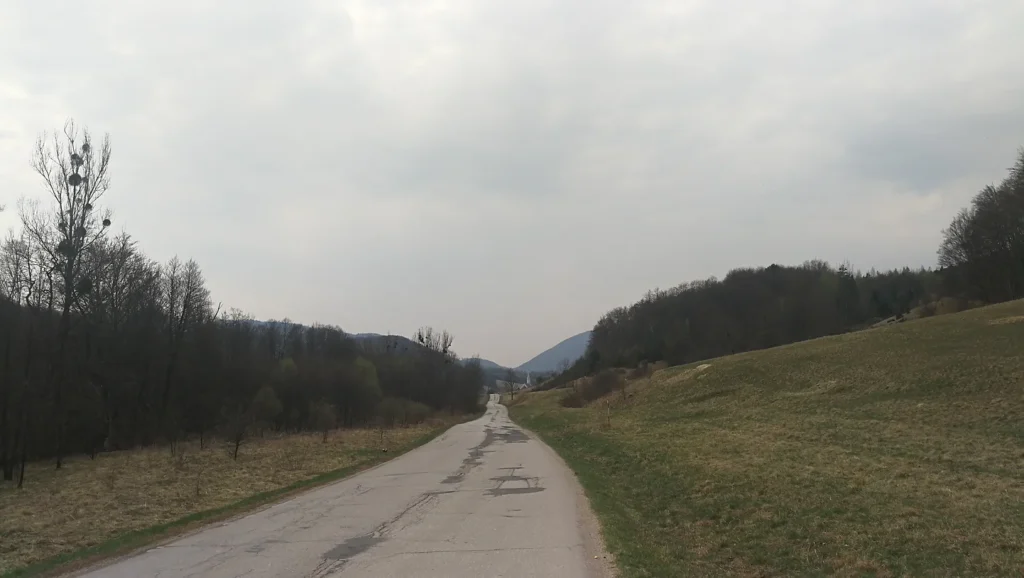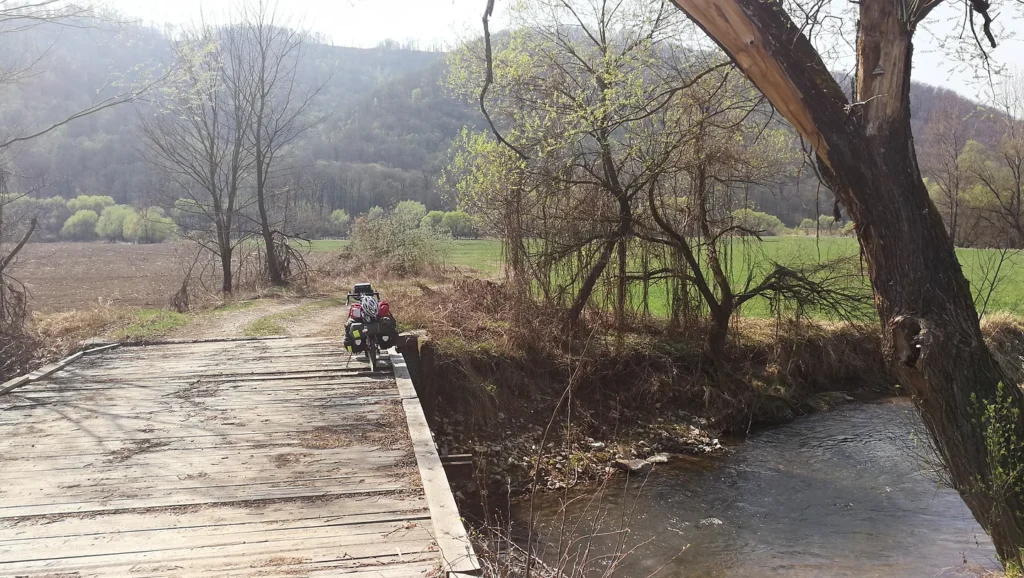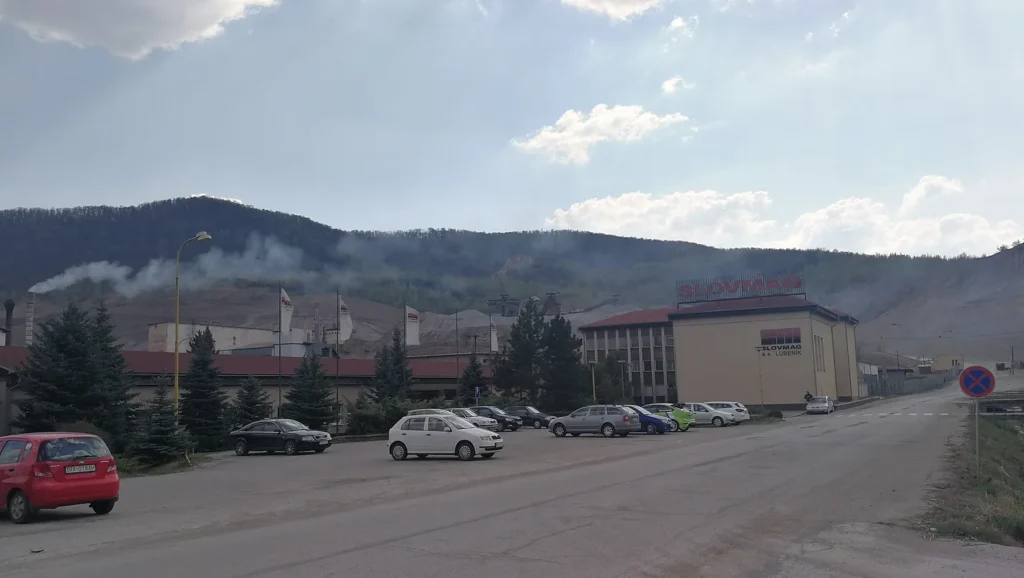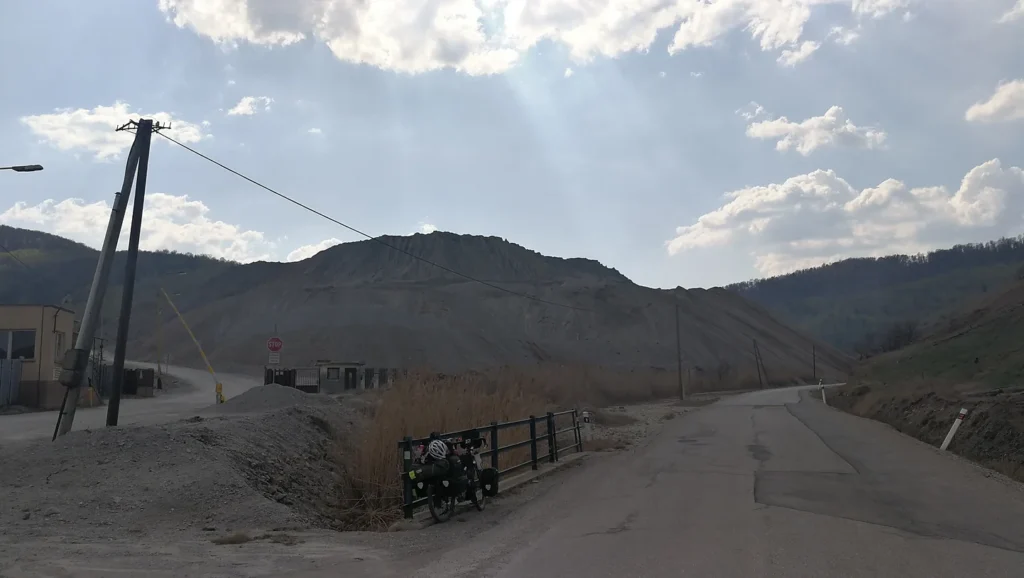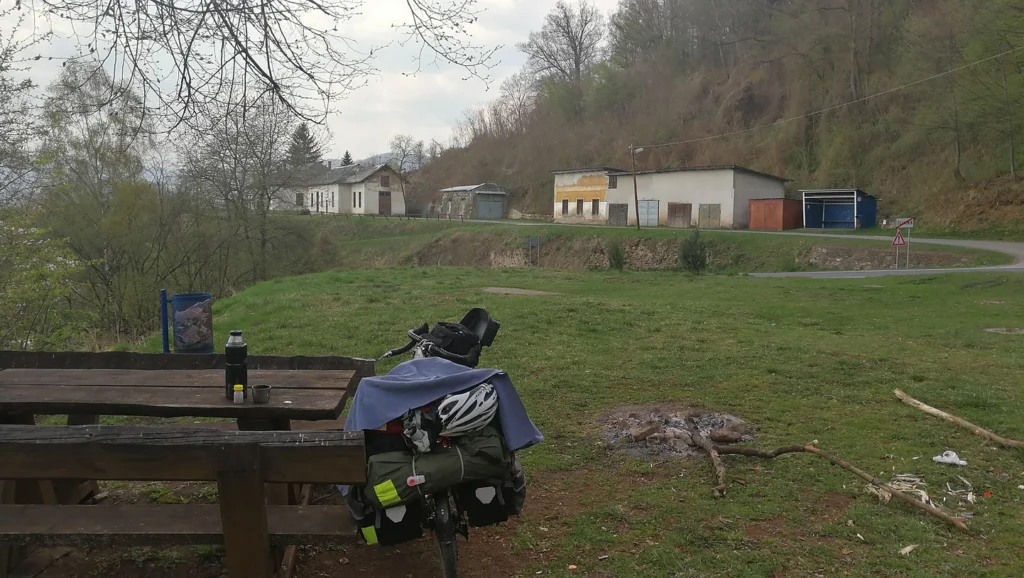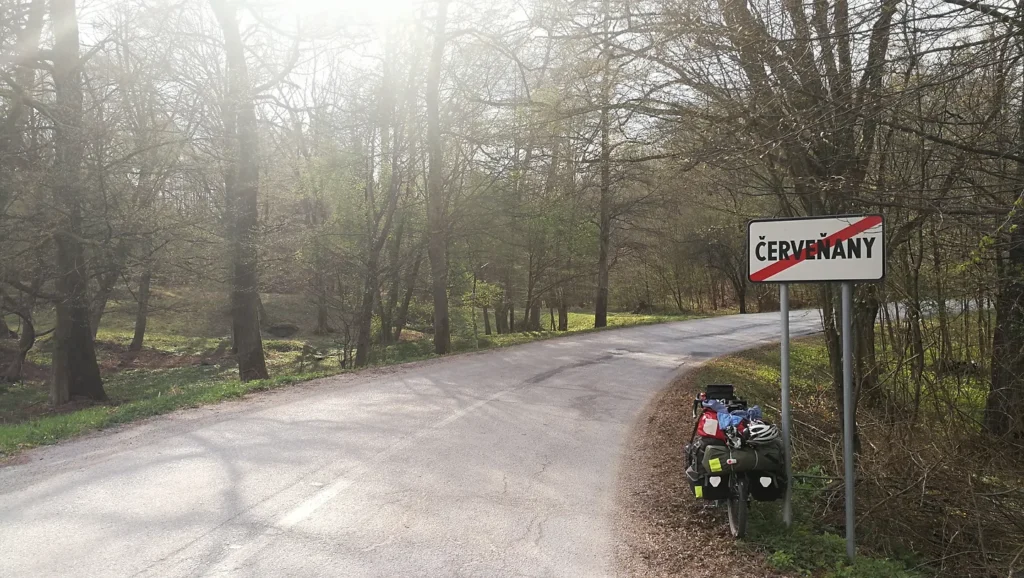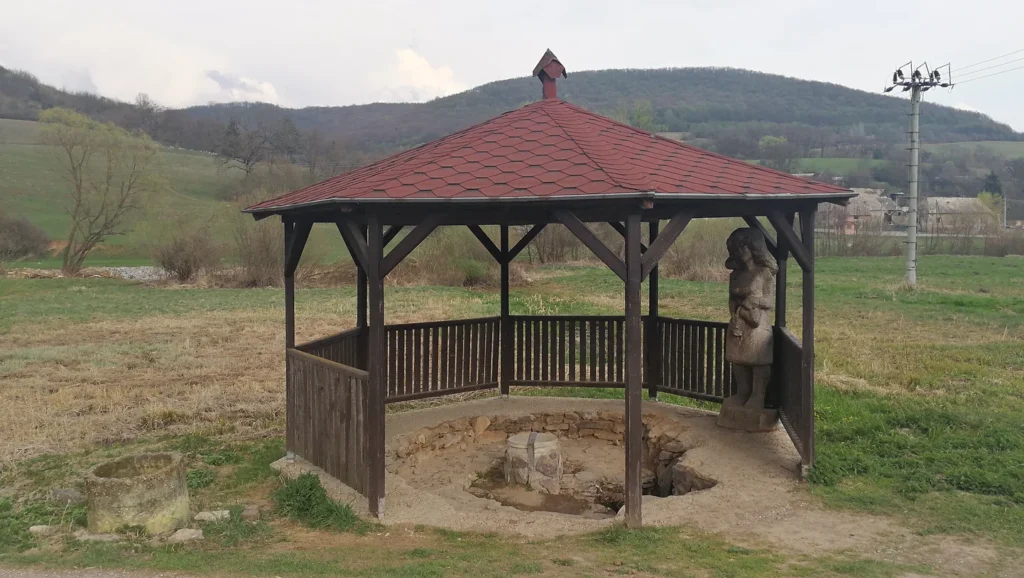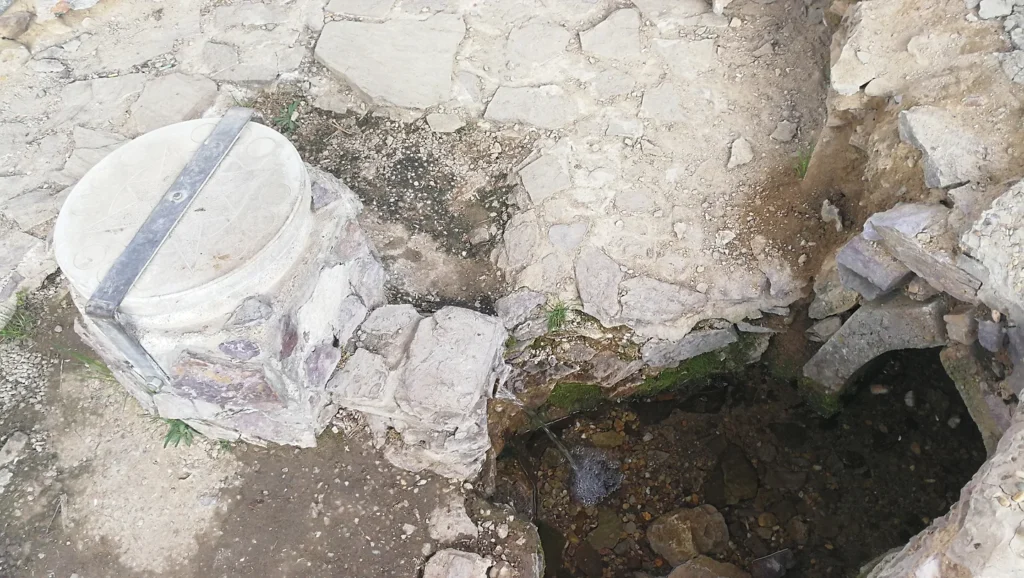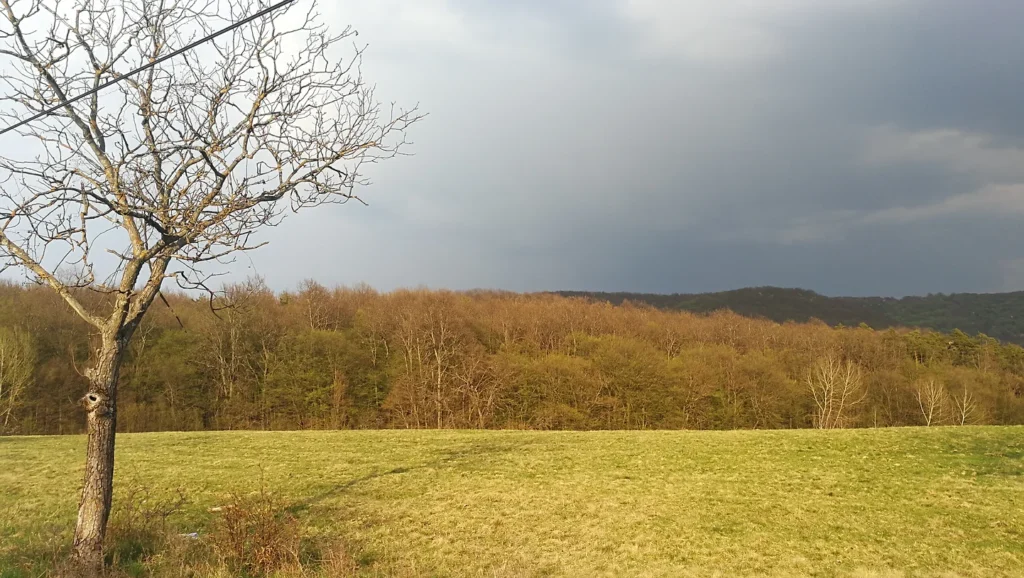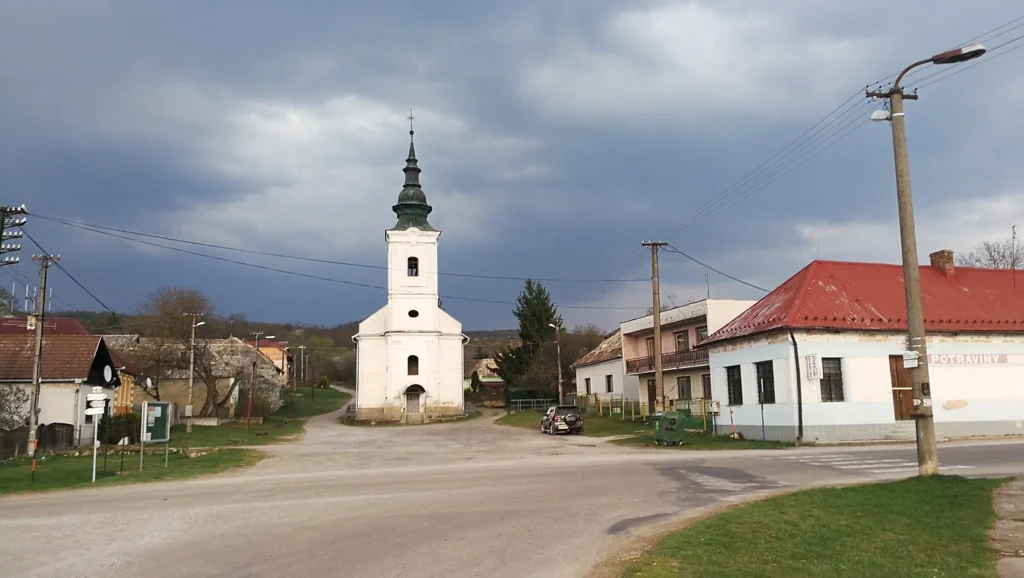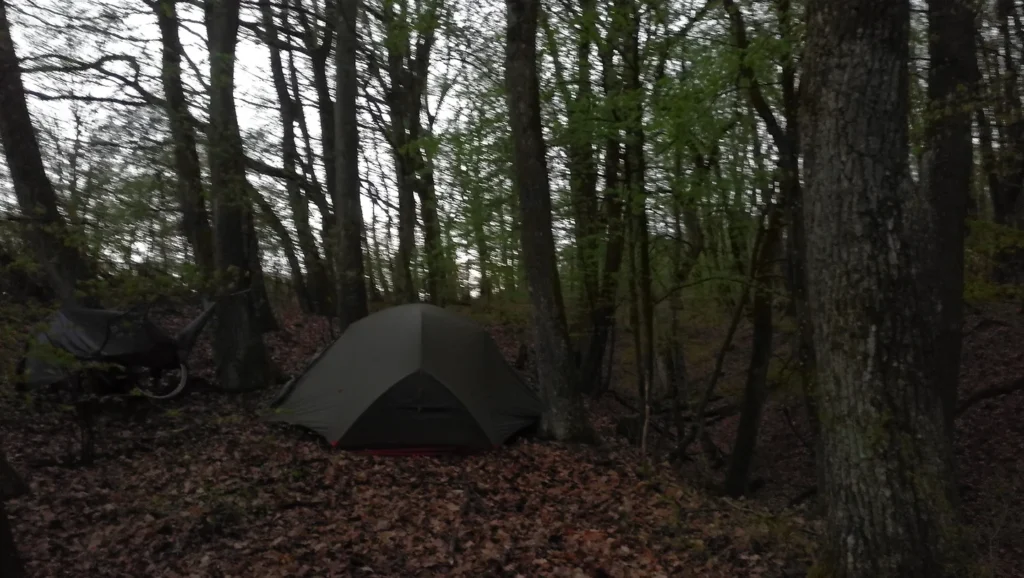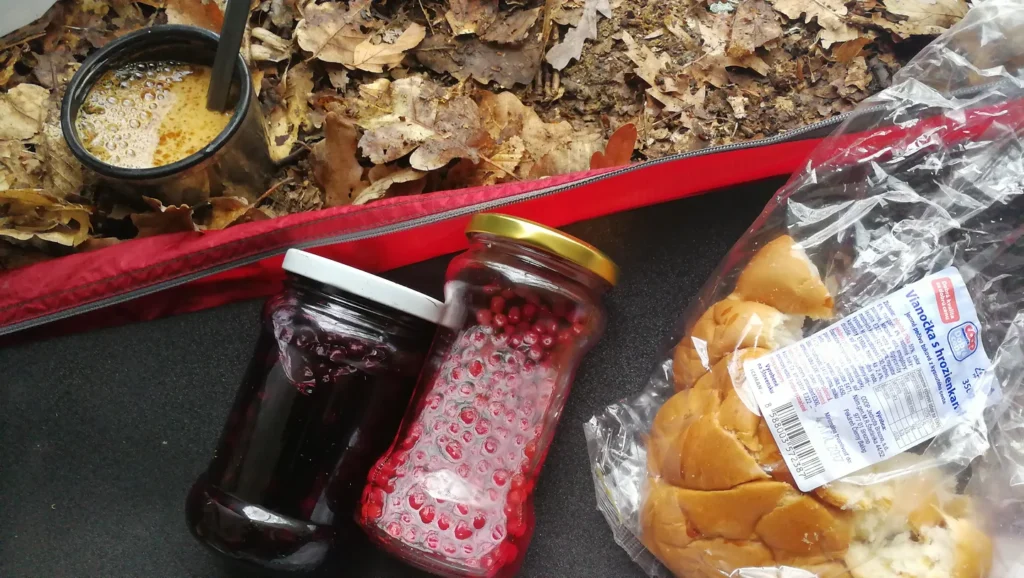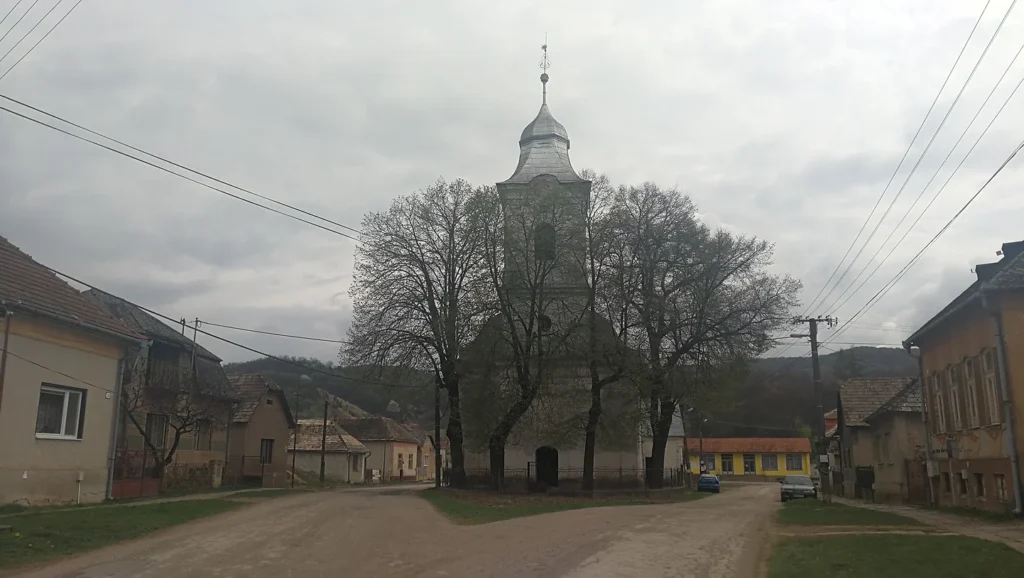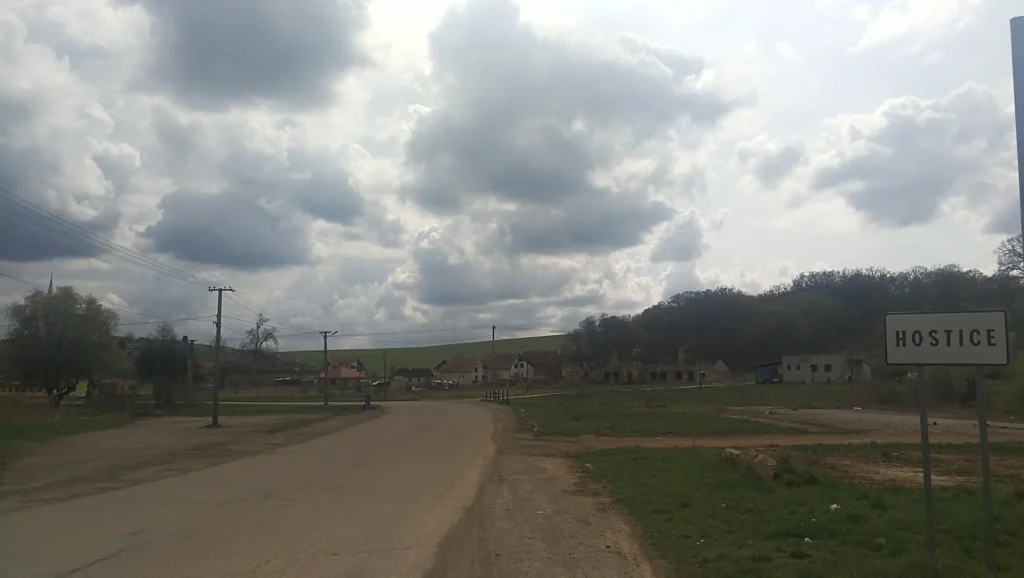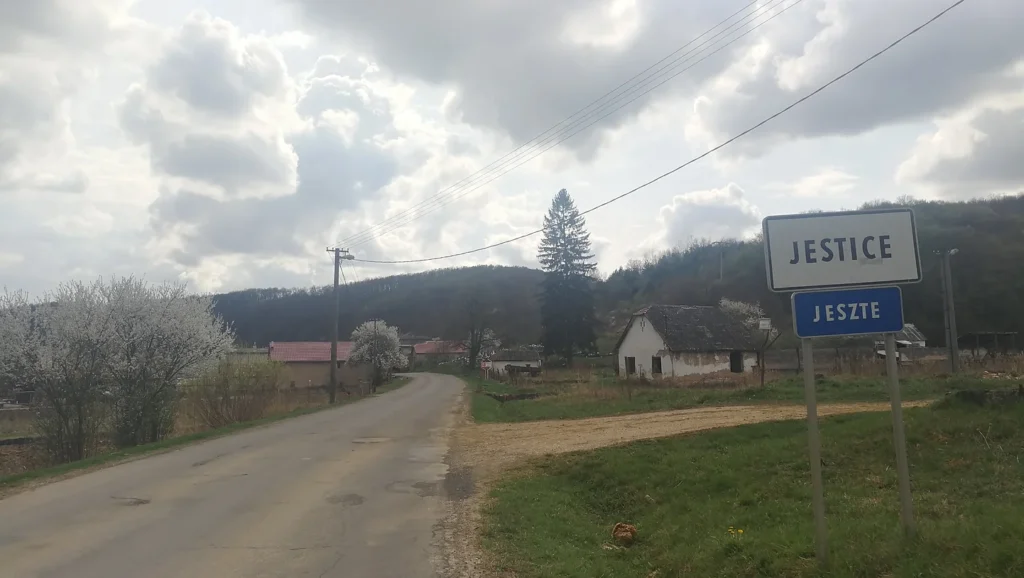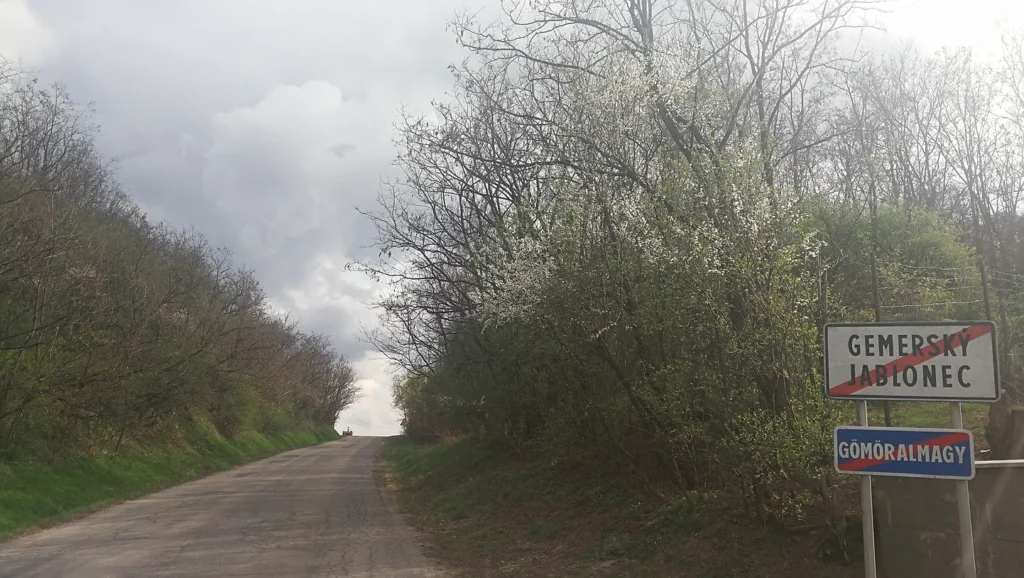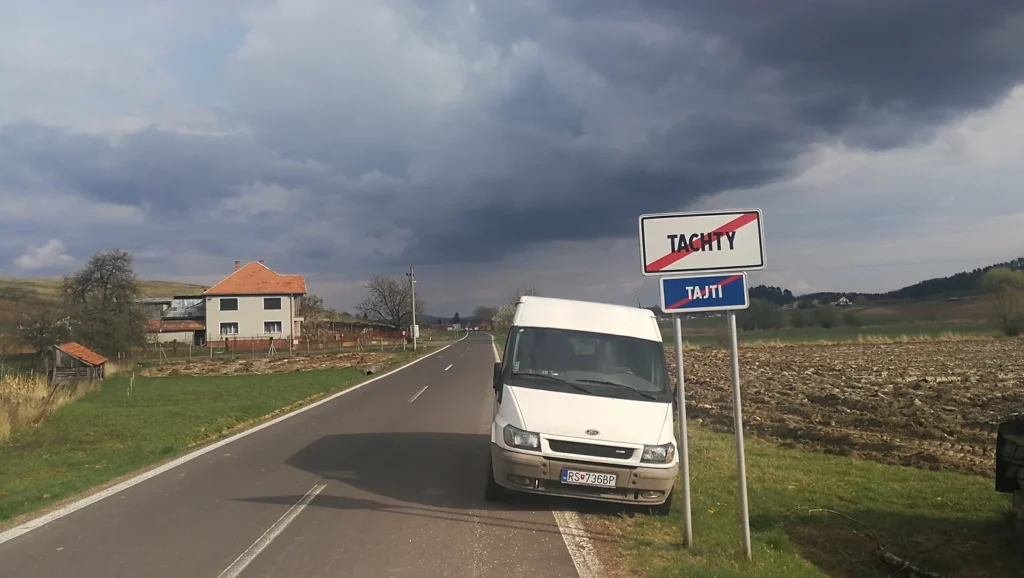Slovakia — Emotions
At the Czech-Slovakian border there was nobody except for a resistance fighter throwing a hand grenade.
On first impression Slovakia is a notch wilder than Poland and Czech Republic. Rougher tarmac. Larger dogs. Most trucks of the brand “Tatra”.
In the evening I found a good camp spot north of Bytča: Hidden from the road, easy access without the need to drag my bike or equipment, and a fresh water stream meaning camp shower. The place also featured some deer and fire salamander.
Breakfast, packing up, I felt ready to cycle into the mountains. But first I wanted to fix the broken tent pole and therefore decided to look for an outdoor shop in Žilina.
Žilina lays peacefully in the Váh river valley surrounded by hills – this area already had human settlements in the Stone Age 20,000 years ago.
I asked around in sports stores until I found a gentleman trying harder. He also didn’t have a spare tent pole but gave me the repair tube from an unsold tent. Thanks a lot – Vďaka!
The broken tent pole had made me feel angry but now I felt grateful for the help I received. Which role do such emotions play in our consciousness?
The exact development of the human brain is still debated. But basically after the Big Bang 13.8 billion years ago, the formation of our earth 4.6 billion years ago, the beginning of life on earth 4 billion years ago, the appearance of multi-cell organisms 0.5-1 billion years ago – after all this prelude the evolving species on earth first learned to “feel emotions” and later to “think words”.
This evolutionary path is still visible in our brain structure. According to common brain models, our current biological human brain has three main parts. First, our “reptilian brain” at the core responsible for vital body functions (e.g. breathing). Second, our “limbic brain” responsible for emotions. Third, our “neocortex” responsible for language, abstract thinking, and imagination.
Thus from an evolutionary point of view, we humans are feeling creatures which later also learned to think – and not at all just thinkers. What does this imply?
It puts our problem of “running into language” into a fundamentally new perspective. Yes, we are a cell pile which “thinks”. And yes, we are a cell pile which can undertake complex intellectual exercises such as “articulating values” or “thinking about ethics” or “reflecting on consciousness”.
But the bottom line remains that we had already been a life form feeling emotions long before we developed complex abstract language enabling us to think in words. Thus despite all the cognitive power of today’s human brain, the emotion part of our existence remains central for our consciousness no matter if we think about ethics, values, or our consciousness itself.
In his book “Descartes’ Error” the neuroscientist Antonio Damasio explains:
“that feelings are a powerful influence on reason, that the brain systems required by the former are enmeshed in those needed by the latter, and that such specific systems are interwoven with those which regulate the body.”
While Descartes had thought about the human mind separately, modern neuroscience has shown a deep integration of our feelings, thinking, and body. For your and my self-exploration of our consciousness this means we must perceive ourselves as a combination of integrated systems – including, but not limited to, our cognition doing “the thinking” while we feel at our core.
For now I had to let the meditation go as I needed to navigate eastbound out of Žilina towards the mountains.
Soon after leaving Žilina eastbound the High Tatra mountains appeared – I felt happy.
I pitched camp by a river and fixed my tent pole with the repair tube I got in Žilina.
The fixed tent was a relief and I promised myself to take better care of my equipment, to be more concentrated in the now.
Today I first cycled through several small towns along the Orava river and then turned south. The wooden roof tiles you see here fit well in this area dominated by forests.
The farmhouses here have a traditional feeling, as if time has stopped. Zero food supply options, zero people on the street.
I saw a farmer sowing a field on a steep hill by hand and I felt respect for his hard work.
What may be long-term effects of smartphones and ubiquitous internet connectivity on our felt emotions? Can we shape those effects proactively by feeling more into our consciousness while we use technology?
I felt freedom and confidence – having the tent pole fixed and cycling in mountain sun made me smile.
I thought I had it all planned out. First some uphill to get better views of the mountains, then a long downhill cruising to the reservoir Liptovská Mara. What could go wrong?
I took a wrong turn and had to push my bike back uphill at a steep section. Lesson learned.
Liptovská Mara is the largest reservoir in Slovakia. It was build to prevent flood risks from the river Váh and to generate electricity. Nine villages were flooded when the reservoir was filled.
I felt anger and aggression against the Nazi whose invasion in 1944 caused almost 20.000 dead in this part of Slovakia. And I felt respect for the resistance fighter who had greeted me at the border checkpoint memorial. Just imagine the courage it takes to start guerrilla operations against the invading Wehrmacht! Would you have joined the resistance?
I cycled further east and pitched camp at the river Váh.
On the one hand, emotions seem simple. No need to cognitively analyze. If the warm buzz in the solar plexus region feels right, don’t analyze and carry on with your life in that direction.
On the other hand, emotions seem complex. Cover emotions, layers, childhood, relationships, and the possibility of all experiences being connected on our life path from cradle to grave. Kind of a hard nut to analyze and understand “in words”.
From an evolutionary perspective emotions brought our species many benefits, for example:
1) Faster reaction: In the jungle we didn’t have time to think when the tiger attacked so switching automatically to fight or flight mode through lightning-fast emotional responses saved us from being eaten. Still today, our reactions are not just faster through emotions but rather emotions allow us to take decisions and be functional in life at all.
We never have enough time and information required to “think in words” about all aspects of a situation – so we constantly take decisions with a feeling component which neuroscience has shown clearly: Humans receiving physical damage of brain parts responsible for emotions are not able anymore to take decisions and generally struggle in life.
2) Sensor fusion: Our emotions and thoughts are team-players when we let them work in a natural balance. In today’s largely tiger-free urban environment emotions still help us with complexity reduction given our limited brain capacity facing a constant stream of sensory input. When a situation seems too complex to analyze cognitively but a decision just “feels right” inside, we can free ourselves of cognitive over-complexity and instead trust our feeling flow.
Who said that situations must be cognitively analyzed in the first place? Just an instant ago in the history of life on earth we were a species without smartphones and without ubiquitous internet connectivity and without all the knowledge of the world in our pocket. We were not knowledge-gathering cognition-focused screen-addicts, we were made to be emotional hunters and gatherers living in nature. Evolutionary, our species hasn’t changed much since then.
3) Wisdom development: In the grand scheme of our lives, it may be feeling our emotions which teaches us things which really matter.
Emotions can also be considered as the gateway to our soul. With this interpretation, letting us feel our emotions means listening to the voice of our “spirituality” or “atheistic subconsciousness” or “underworld” – depending on your prefered terminology and world concept.
Joseph Campbell, who wrote on comparative mythology and religion, described the idea of emotions being the gateway to our soul this way:
“Heaven and hell are within us, and all the gods are within us.”
Emotions are within us. We feel what our consciousness believes to be good and evil. We feel when we do things right or wrong according to our inner voice and feeling experience.
Today Slovakia showed its bright side and the blue sky and white mountain peaks made the hours and hills fly by.
The highest peaks of the High Tatras are around 2.600 meter and these mountains have always played an important role in Slovakian history. For example, the writer and politician Ľudovít Štúr, who pushed for Slovakian to be an own language, climbed mount Kriváň in 1841 which is commemorated by yearly excursions to the summit.
I listened inside myself and today the dominating emotion I felt was freedom.
I didn’t want to analyze this emotion with words in my consciousness. I simply wanted to enjoy the feeling of being free.
What is your relationship with your soul?
Given that our emotions are central in our mind-body system, we probably don’t get very far in life towards something like “integrated living” or “truly being oneself” or “being authentic” without listening into our soul.
Soul – what is that? What is consciousness, our identity, our personality, our character, our self?
People use those terms in various ways and I think all of them are equally right as words are just placeholders pointing towards a deeper reality – our unique human existence which is always an individual experience in a joint overall reality.
Perhaps “soul” is more limited in scope as the term carries a certain conceptually boundary (e.g. “my” vs. “your” soul) whereas “consciousness” can expand towards something larger than one individual human? Up for an existential linguistic debate.
Words are not important. It’s probably well-invested time to reflect a bit on terminology expressing our world concepts (e.g. Who am I? How does reality work?) – but overcoming words and leaving language-based concepts behind is what follows anyways if we choose so.
I believe all words remain just an intellectual pastime and distraction as long as we don’t feel what the words truly mean – what the placeholders stand for in the “real” reality.
So instead of “answering in words” how our relationship with our soul is, deeper answers may be found by choosing to feel under our masks and concepts and emotional armor. It’s a choice we can all make in every life situation and I believe with some self-reflection practice it becomes easy for everyone.
And it’s you who wants to win the battle for the possession of your soul, right? You want to look deeper into your consciousness following this silent mysterious pull you feel, right?
In the afternoon I cycled past a large German Military Cemetery in Važec. It contains around 8,000 graves of soldiers fallen between 1939-1945.
I wasn’t sure how I should feel about the dead soldiers. On the one hand they served the Nazi regime. On the other hand they probably just wanted to live their lives the best way they could, just like you and me.
How many of them left families behind? Are there any winners coming out of wars?
Perhaps we shouldn’t ask how we “should feel” about something. Perhaps it’s healthier and more natural to just directly feel without imposing morally constructed values on our feelings.
Are our emotions always real or can they be illusions in our consciousness?
Deep inside, was I truly happy about Slovakia’s snow peaks or did I just have the cognitive idea that here the feeling response “happiness” was situational appropriate given my self-perception as a mountain lover?
In Poprad I turned south towards Hungary. This meant leaving the flat river Váh valley and cycling up the Low Tatra mountain range with dense forests home to wolf, bear and lynx.
I thought I had found the most hidden camp spot possible as I crossed a small creek to get to it and it was deep in the middle of nowhere. It turned out, at breakfast two dogs came by. They looked well cared and could have been hunting dogs. An hour later while I packed up my equipment, two Roma men from the next town some kilometers away came by searching firewood.
Since my start in Berlin I wondered about Wittgenstein. He thought our running against the “boundaries of language” was hopeless but I realized I didn’t share this view.
Yes, our cognition is far to limited to grasp our reality completely. But we are not a thinking machine separated from our body – Descartes was wrong.
And Wittgenstein, perhaps due to his personal harsh family biography, seemed to have been overly cognition-focused when searching for answers to the deep questions of life. Perhaps he just didn’t have someone who loved him unconditionally, someone who was there to listen when we needed to feel and express and heal his pain.
You and me and all our fellow human sisters and brothers have emotions and feeling them gives us a powerful second compass to navigate our life – a compass deeper than our thinking.
I believe our consciousness always listens to both life compasses in parallel. In my perception, our cognition often screams louder and tends to strive for control in our cognition-focused modern world. But I’m convinced that re-connecting with our emotions is what we all can do when we practice one thing: allowing us to feel the emotions inside ourselves. That’s definitely a core part of our individual answer to the question “Who am I?”.
Is our emotional life compass the more powerful one to find meaning and self-fulfillment in our life?
Who knows, some deep answers we seek may come when we stop asking questions and simply marvel at the beauty of the stars.
In the morning I cycled uphill in the heat for some hours on a road winding up through Slovak Paradise National Park. What a name!
This large national park offers 300 km of hiking trails and belongs to Natura 2000, a network of nature protection areas of the European Union. The EU’s Nature 2000 network exists since over 30 years and covers 18% of the EU’s land area. For new EU candidate countries, it is compulsory to propose such nature protection areas meeting the same criteria as existing EU member states – pretty cool.
While cycling through the Low Tatra forest I listened into my consciousness. Given that the survival of you and me and all other humans depends on a functioning biosphere – should we maintain it?
Personally, I feel that I want to pass on a livable world to the next generation. I feel that I want to be remembered as someone who cared for the next generation and as someone who translated this value into action. And I want this also for you because I care for you and I want that you live in a healthy biosphere and nature, dear reader.
I feel we humans are quite powerful given the many choices we can make every day … consuming a bit more sustainable, or cultivating a bit more self-reflection inside us. And honestly I’m pretty confident that you and me and the rest of humanity can change the world together – especially when we face challenges.
The more I cycled up into Slovak Paradise National Park, the more my consciousness meditation got replaced by biological signals from my body. I hadn’t found water in hours and felt dehydrated and overexerted – I had pushed my body too far.
Just before the pass when I felt shitty, I met Vlado who lives south of Kráľova hoľa, the highest peak in the Low Tatra range with about 2,000 meter elevation. Vlado invited me to stay with him and I happily accepted.
Vlado is a carpenter building impressive wooden houses like this:
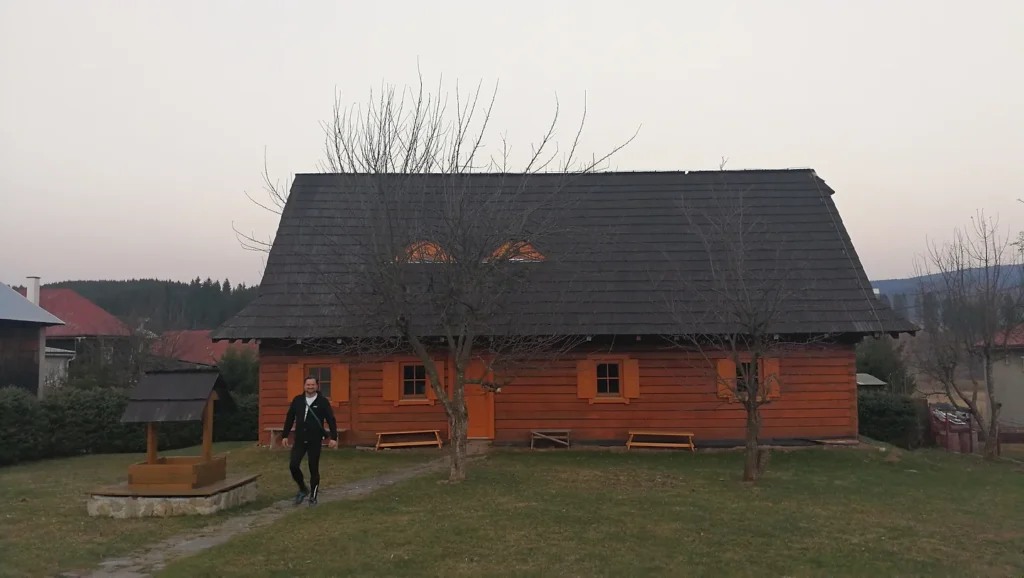
In the evening Vlado and I played lots of chess. After the heat this morning it suddenly snowed at night down to 1,000 meter elevation.
Vlado invited me for a sightseeing day so I stayed another night and he showed me his region.
We started by visiting the source of the river Hron – downstream the river becomes mighty and drains into the Black Sea via the Danube.
Vlado is one of the first customers getting that Hron spring water from his tap. After 6 years of usage, his kitchen sink still looks sparkling clean because the water is so pure.
The Slovak Paradise National Park showed first signs of spring:
The trainstation’s name Dobšinská Ľadová Jaskyňa means Dobšinská Ice Cave. It’s a nearby UNESCO World Heritage ice cage containing one of the world largest glaciers inside a cage with ice thickness up to 25 meter.
When are the Slovakian brown bears waking up from their winter hibernation? Over the last 20 years their numbers have tripled to about 2700 bears today.
In the evening we met Vlado’s very nice parents. His dad, a former Waldorf school teacher, is a passionate geography fan and knows the world geography impressively well. And his mom cooked us delicious self-made Slovakian food while we chatted about the world. Thank you very much – Vďaka!
Perhaps the whole consciousness journey thing wasn’t so complicated. Perhaps loving life translates automatically into helping others … and may bring us the happiness we all seek.
I cruised downhill for the first half of the day. The more I descended, the more spring had already come.
Mighty forests valleys and a last dog looking able and willing to tackle a bear, then I was out of the mountains and rode through flatter terrain towards the Hungarian border.
Cycling back into a human settlements after a nature stretch always feels like I have been away from civilization for a long time – I get this feeling no matter if it was hours or days. Perhaps our consciousness perceives time differently in nature?
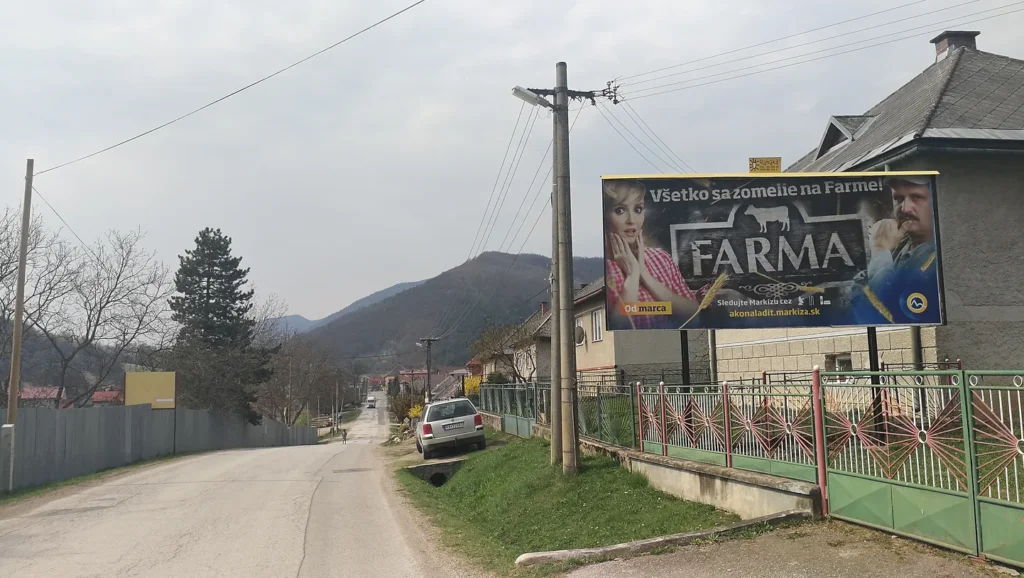
Have you ever wondered how you co-exist with other humans on an existential level? I am a consciousness writing these word and you are a consciousness reading these words – hi!
I don’t know who you are my human brother or sister reading this. What’s your name? Where did you grow up? Do you like riding bicycles?
I mean sure we both have a body and a name and all that. But on a deeper level … how does that really work existing in each other’s consciousness? I’m just a cyclist, I don’t know.
Of course there is a certain information asymmetry between us. You know things about my life, my bike tour, my views regarding the human condition. In contrast, I know nothing about you individually as “the reader”.
But I have been thinking about our relationship and there is something I would like to tell you: whoever you are and whatever you do, you are important to me. And I truly want you, dear reader reading these words in this moment of your life, to be well.
This is not because you are reading my words but rather because you are a fellow human in general – I also want your best if you live in the Sahel region as a livestock herder, or in Vladivostok as a pipeline engineer, or in Tokyo as a toilet cleaner, and you never see this website and you never become aware that I even exist … I would wish you equally well.
I honestly feel that it’s great to be human and that the consciousness journey of life we all make together is exciting. Sure, we all suffer at times and in the end we die. But isn’t the human condition overall fascinating and deep?
Whoever you are and whatever you do, to me you matter. And as a fellow human I wish you from my heart that you shape for yourself a good life path with the courage to be your true self – that you find in your life meaning.
In the afternoon I cycled past a magnesite ore extraction plant with massive mining activities nearby.
Another small pass, another coffee break … cycling is like life in general.
I don’t want to overstretch the “after the rain comes sun” simplification but in my eyes it’s true – I feel that we can somehow trust in life. It has a rough side, it has a tender side – and a million reasons to live it well.
A spring by the roadside. I love how the people here take care of it and made it a public place to get water.
In the evening a thunderstorm chased me but I got away:
I pitched camp in a forest south of Padarovce:
Yesterday evening I had spanned up my tarp to collect rain water for breakfast but the evening rain stopped and it had stayed dry all night. Good thing I still had some biketouring superfood from Vlado’s parents.
I packed up my tent and started cycling towards Hungary. I knew I would miss the Slovakian mountains but I felt confident to find new mountains along the route.
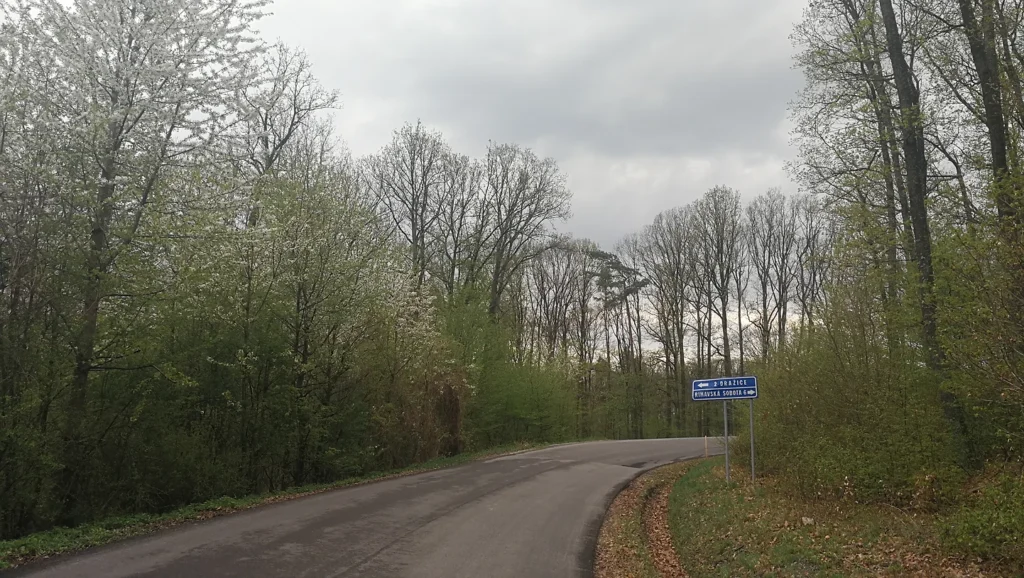
Are our emotions the key to overcome our boundaries of language? Perhaps truly deep answers are found by feeling more and thinking less.
Perhaps humans need some form of cognitive myths like Joseph Campbell argued, some concepts articulated in language we can hold on to while we open up emotionally. Like an explanation of who we are and how our reality works expressed in nice little words – words we can let go.
Sleepy towns close to the border. Nobody around.
“Shadow and light” – what do you make of it seen existentially?
Personally, I guess they are somehow interwoven in our human existence just like the weather. If that’s the case, we can always find beauty in the dark – but also dark in the beauty.
Perhaps everything is going to be just fine in the end … you tell me!
Breathing in, breathing out.
In Slovakia I felt anger about my broken tent pole and I felt thankful for the man in Žilina who gave me the repair tube for my tent. I felt freedom cycling along the High Tatra mountains and I felt a certain sadness when I stopped at the cemetery at Važec holding thousands of graves.
And I felt trust and friendship when I met Vlado who invited me to stay with him, showed me his region, and overall reminded me that life is not about being a sole consciousness philosopher but rather about human connection and giving to others.
